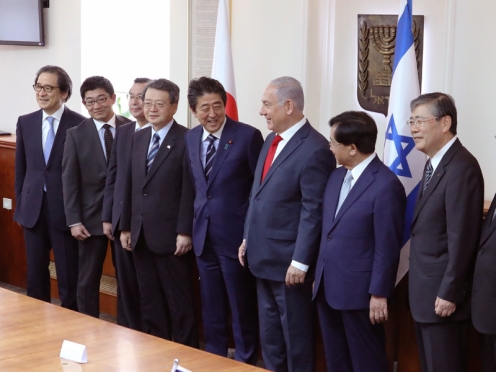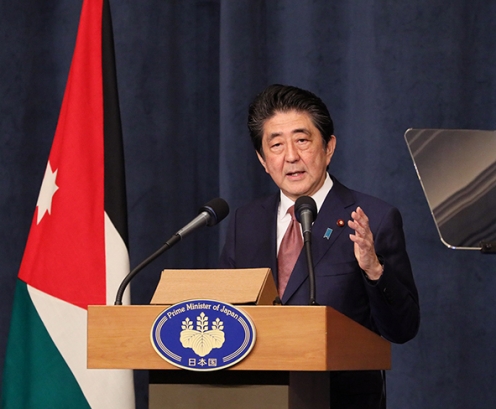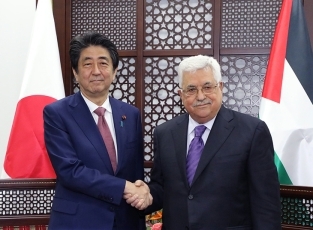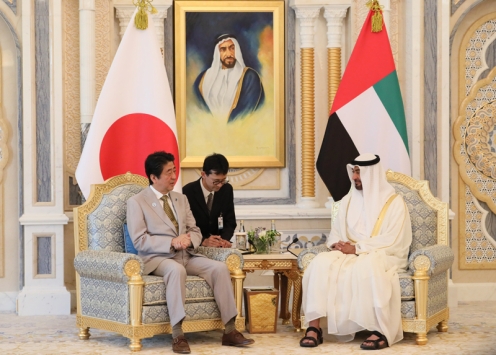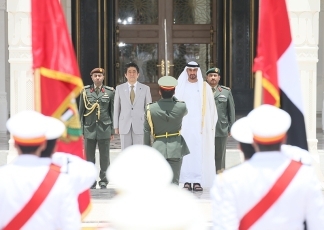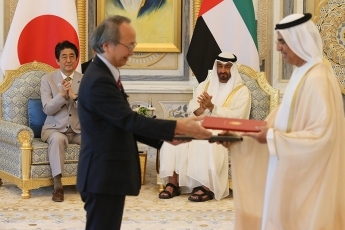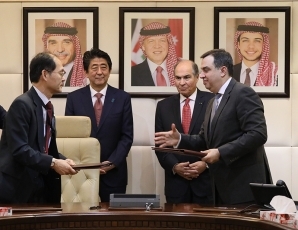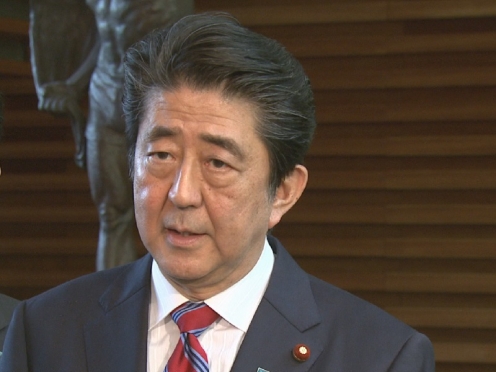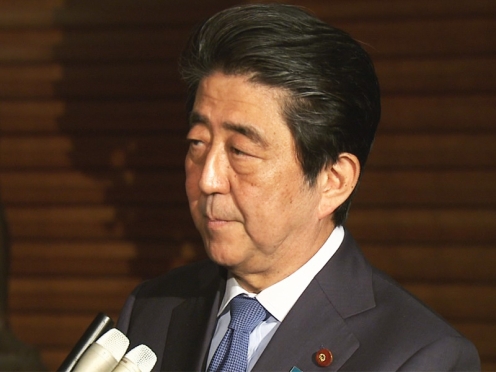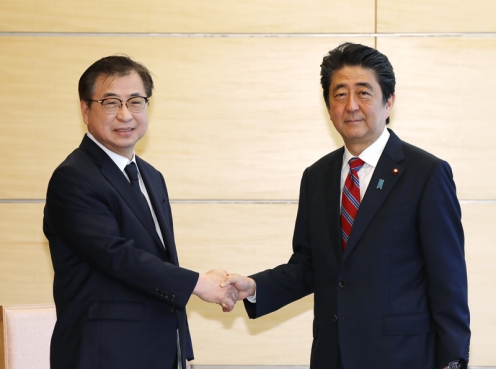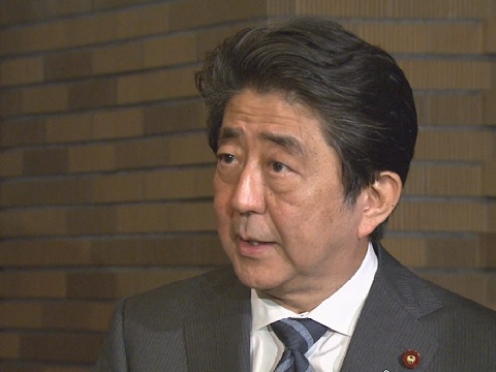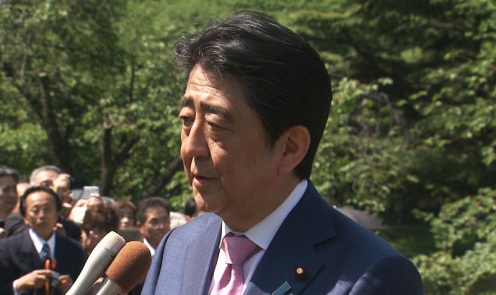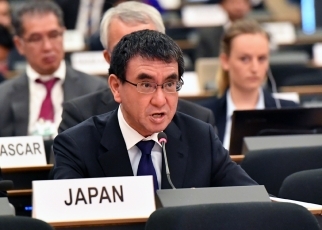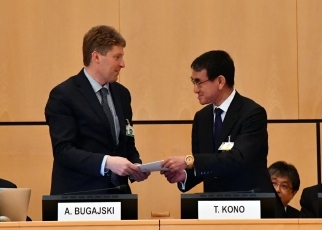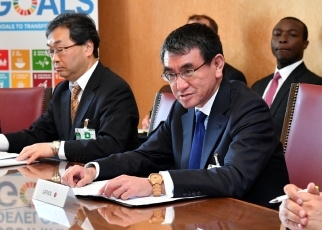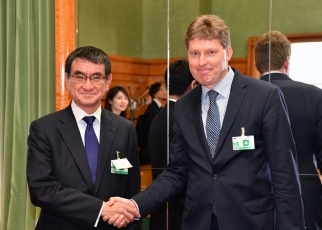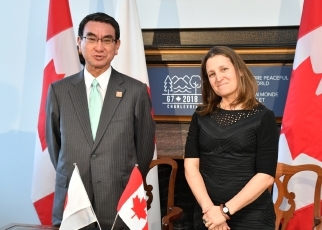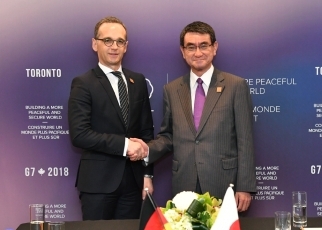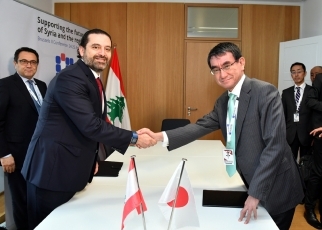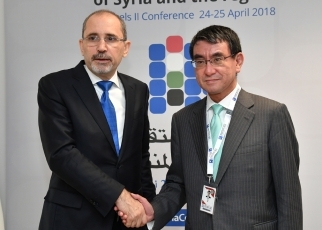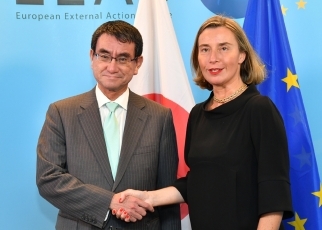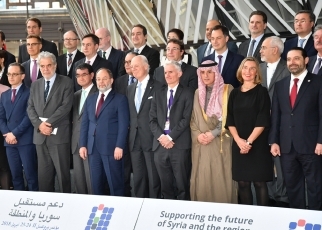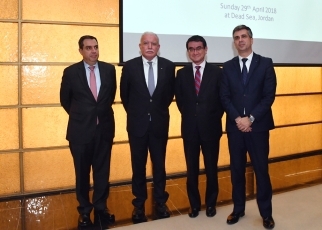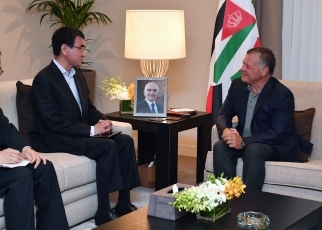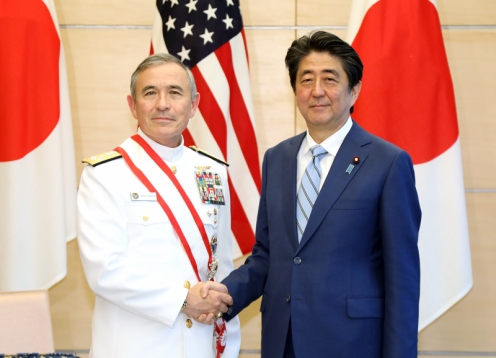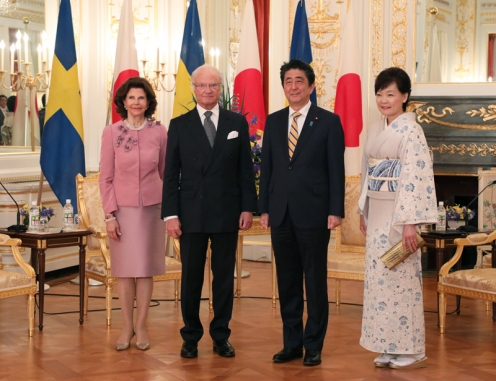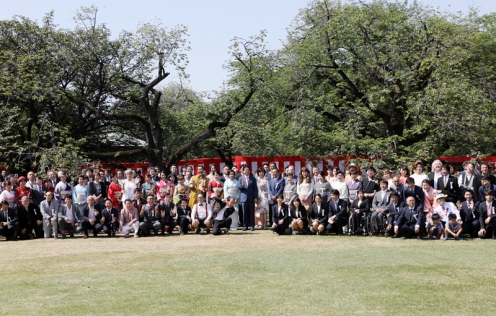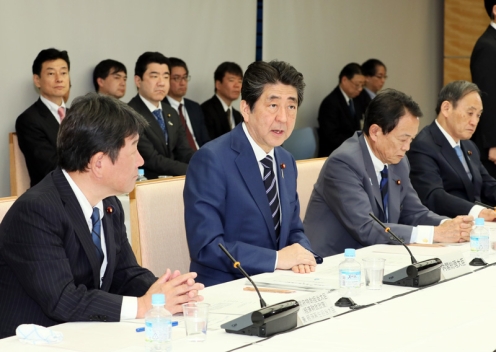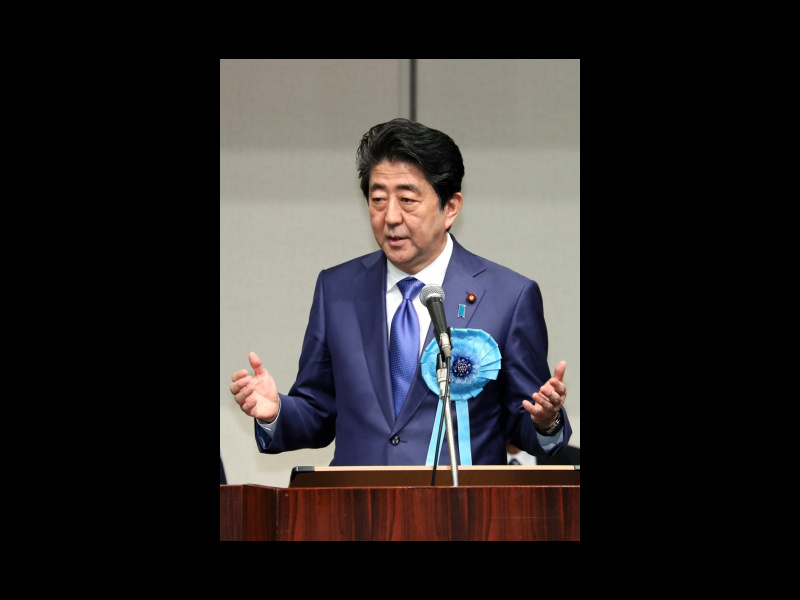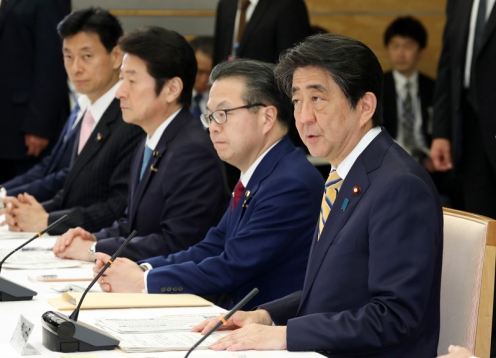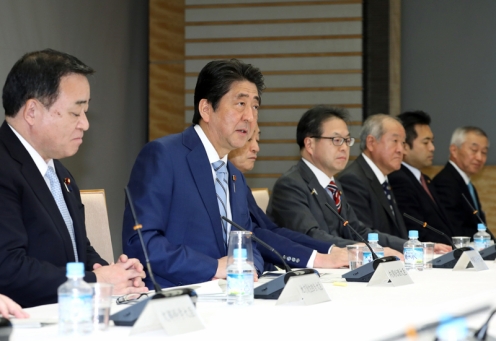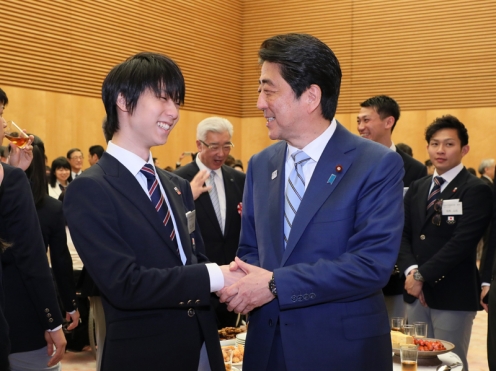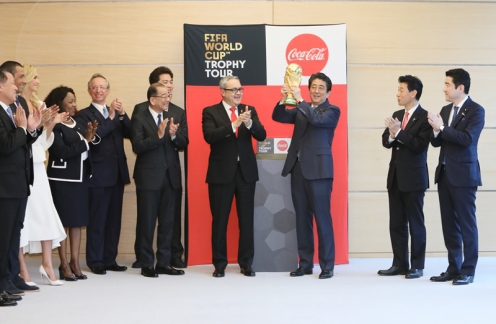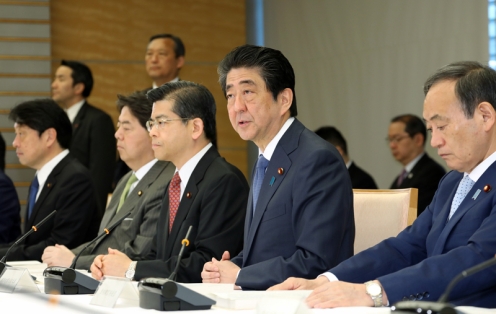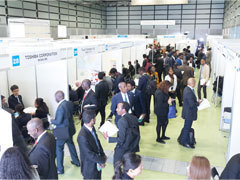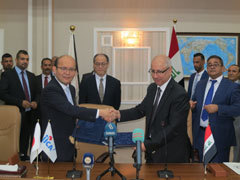Visit to the Middle East: Fourth Day
Cabinet Secretariat, Monday, May 7, 2018
[Provisional Translation]
On May 2, 2018 (local time), Prime Minister Shinzo Abe visited the Jericho Agro-Industrial Park (JAIP) in Palestine (Jericho).
After that, the Prime Minister visited the State of Israel, and held a meeting with H.E. Mr. Benjamin Netanyahu, Prime Minister of Israel.
In the afternoon, Prime Minister Abe visited Palestine (Bethlehem), where he took a tour of the Church of the Nativity.
After visiting JAIP, the Prime Minister said the following,
“I am truly pleased to have realized my wish of visiting the Jericho Agro-Industrial Park (JAIP). This park can be described as Japan’s unique contribution to the Middle East Peace Process and a flagship project of Japan.
This area was a complete barren land about 10 years ago when the first Abe administration approved this project. Now, it has been transformed to a place where 12 Palestinian companies operate, generating employment for 200 people. Through Phase 2 of the project, this number is expected to increase to 300 or 400. I was told that a Japanese company will be opening a café here soon, and I hope that it will become a place where the locals can relax and interact.
The JAIP produces processed agricultural products and other items in this Palestinian land, creates employment, and generates profits. It also fosters mutual trust among the respective stakeholders who are vital to the Middle East Peace Process.
It could be said that the JAIP’s success is the result of the cooperation of Jordan, Palestine, Israel, and Japan. Going forward, the JAIP will contribute to Palestine’s self-reliance in economic development, and to building mutual trust among the respective stakeholders.
The stability of the Middle East is essential to Japan. Most of Japan’s energy comes from the Middle East. Along with ensuring stable supplies of petroleum gas, the objective of this project is for Japan to make a unique contribution to peace and stability in the region.
Yesterday, I held a meeting with President Abbas of Palestine, and after this, I am scheduled to hold a meeting with Prime Minister Netanyahu of Israel. Through these talks, Japan will make some valuable contributions to the Middle East Peace Process. Furthermore, with regard to the JAIP, a ministerial level meeting was also held among the four countries just a while ago. Japan will harness the JAIP to contribute to the achievement of peace in the Middle East. Thus far, it has been often said that energy was the only connection between the Middle East and Japan. Nowadays, we have a multilayered relationship that involves cooperation in very diverse areas, such as politics, diplomacy, education, and agriculture, as well as in the international arena. In this context, Japan will deepen its relationship with the Middle East further and contribute actively to the region.”
Visit to the Middle East: Third Day
Cabinet Secretariat, Monday, May 7, 2018
[Provisional Translation]
On May 1, 2018 (local time), Prime Minister Shinzo Abe, who is visiting the Hashemite Kingdom of Jordan, attended a welcome ceremony, followed by a meeting with H.E. Dr. Hani Al-Mulki, Prime Minister of Jordan. Prime Minister Abe then attended a signing ceremony.
After that, Prime Minister Abe attended a welcome event, and then exchanged greetings with His Majesty King Abdullah II bin Al-Hussein of Jordan.
Following that, Prime Minister Abe held a meeting with His Majesty King Abdullah, and at midday, attended a working lunch with the economic mission.
In the afternoon, Prime Minister Abe held a press conference.
After that, the Prime Minister visited Palestine, and held a meeting with H.E. Dr. Mahmoud Abbas, President of Palestine.
Japan-Palestine Summit Meeting
Foreign Affairs, Wednesday, May 2, 2018
On May 1st, commencing at 7:15 p.m. for approximately 45 minutes, Mr. Shinzo Abe, Prime Minister of Japan, during his visit to Palestine, held a summit meeting with H.E. Dr. Mahmoud Abbas, President of Palestine, at the Prime Minister’s Office. The overview of the meeting is as follows.
1. At the beginning, President Abbas welcomed Prime Minister Abe and expressed his sincere gratitude for Japan’s consistent support. He then explained the current situation surrounding Palestine. In response, Prime Minister Abe welcomed their reunion after 2 years and given that Palestine is currently in a very difficult situation with issues such as Jerusalem, expressed that Japan is in support for a two-state solution and that he came on this trip to communicate that Japan is determined to take on an active role in the Middle East Peace Process. Furthermore, with regards to the Jericho Agro-Industrial Park (JAIP), which was agreed upon during the first Abe Administration, Prime Minister Abe mentioned that he will be visiting the JAIP on the following day, May 2nd, for the first time. He expressed that he hopes this visit would further develop the Japan-Palestine relationship.
2. Discussions were then made on the Middle East Peace Process. Prime Minister Abe expressed that Japan understands the sensitiveness of Jerusalem for Palestine and that he believes that the issue should be resolved through negotiations, based on the consent of both parties and relevant UN resolutions. He also stated that Japan will not be moving its embassy to Jerusalem. In addition, Prime Minister Abe indicated that the role of the US is indispensable and if the US were to suggest a solution, it is important that Palestine accepts and sits at the negotiation table. He pointed out that in the end, there will be no resolution to the issue without direct negotiation between the both parties. In response, President Abbas expressed his gratitude for Japan’s consistent support and assistance and that he looks forward to Japan’s role in achieving peace in the Middle East.
3. With regards to Japan’s aid towards Palestine, Prime Minister Abe indicated that Japan has provide a total of about 1.86 billion USD of aid towards Palestine and that an additional aid of 10 million USD through the United Nations Relief and Works Agency for Palestine Refugees in the Near East (UNRWA) was decided on April 24th. In addition, he stated that Japan is ready to provide additional food assistance. As basic infrastructure such as water facilities is necessary for basic livelihood in Gaza, he explained that Japan has already declared providing up to 10 million USD towards the Gaza Central Desalination Plant project.
4. On the “Corridor for Peace and Prosperity” initiative, both leaders welcomed the agreement at the Four-Party Ministerial Meeting on the construction of an access road from JAIP to the Jordanian border. Prime Minister Abe stated that Japan is ready to provide assistance towards the construction of the access road and that he hopes for its early commencement. President Abbas said that this project an excellent project “Made in Japan” and that it provides hope for the Palestinian people and that he looks to further cooperate.
5. Regarding the situation in Palestine, Prime Minister Abe stated that for the improvement and stability of the humanitarian situation in Gaza, through reaching reconciliation, it is necessary that the Palestinian Authority will be able to govern Gaza. In response, President Abbas explained on the outcomes of the Palestinian National Council (PNC) and the future prospects of the situation.
6. Finally, on the situation in North Korea, Prime Minister Abe gave an explanation on Japan’s stance. He stated that in order to achieve the Complete, Verifiable and Irreversible Dismantlement (CVID) of weapons of mass destruction and ballistic missiles, maximum pressure must be maintained and that the Middle East should not become a loophole for sanctions. Prime Minister Abe also explained that the abduction issue is the most important issue for Japan. President Abbas responded by expressing support for Japan’s stance and that he would like to cooperate towards the resolution of the abduction issue.
Visit to the Middle East: First and Second Days
Cabinet Secretariat, Wednesday, May 2, 2018
[Provisional Translation]
On April 29, 2018 (local time), Prime Minister Shinzo Abe visited the United Arab Emirates (UAE).
The Prime Minister visited the Founder’s Memorial.
On April 30 (local time), Prime Minister Abe first attended the Japan-UAE Business Forum, and then attended a guard of honor ceremony and welcome ceremony at the Presidential Palace. Following this, the members of the delegation accompanying the Prime Minister expressed their respects, and a commemorative photograph session with the economic mission was held.
The Prime Minister also held a meeting and an exchange of documents ceremony with H.H. Sheikh Mohammed bin Zayed Al Nahyan, Crown Prince of Abu Dhabi. At midday, Prime Minister Abe attended a luncheon hosted by the Crown Prince.
In the afternoon, the Prime Minister visited the Sheikh Zayed Grand Mosque, as well as a memorial commemorating those who have lost their lives in service to the UAE.
After that, Prime Minister Abe visited the Hashemite Kingdom of Jordan.
Prime Minister Abe Visits the United Arab Emirates
Foreign Affairs, Monday, April 30, 2018
Prime Minister Abe visited Abu Dhabi, the United Arab Emirates from Sunday, April 29 to Monday, April 30. The overview is as follows.
1 Main Events
(1) Visit to the Monument to the Founding Father of the UAE
(2) Attendance at the Japan-UAE Business Forum
(3) Meeting with Crown Prince Mohammed of Abu Dhabi and a luncheon hosted by the Crown Prince
(4) Visit to the Sheikh Zayed Grand Mosque
(5) Wreath-laying at the memorial monument for martyrs (Wahat Al Karama)
2 Overview and Outcomes
(1) Sunday, April 29
(A) Visit to the Monument to the Founding Father of the UAE
Commencing from 9:30 p.m. for approximately 20 minutes, Prime Minister Abe visited the memorial monument for the late Sheikh Zayed, the founding father and first president of the UAE, and received an explanation about the president's achievements, etc.
(2) Monday, April 30
(A) Attendance at the Japan-UAE Business Forum
Commencing from 10:40 a.m. for approximately 15 minutes, Prime Minister Abe attended the Japan-UAE Business Forum, and in his speech he talked about further strengthening of the strategic partnership with the UAE going beyond the energy field and about cooperation in infrastructure, culture, education, and cutting-edge technology fields including space development, and he emphasized that he would advance promotion of Japan-made food products such as high-quality fruits and vegetables.
The participants in the economic mission accompanying Prime Minister Abe and many other people from the public and private sectors in Japan and the UAE participated in this forum, and held lively exchanges of views about infrastructure development, energy, space development, development of industries, and human resources development. Furthermore, a food tasting event and business talks were held for Japan-made food products such as fruits and vegetables.
(B) Meeting with Crown Prince Mohammed of Abu Dhabi and a luncheon hosted by the Crown Prince
Commencing from 12:10 p.m. for approximately one hour, Prime Minister Abe held a meeting with H.H. Sheikh Mohamed bin Zayed Al Nahyan, Crown Prince of Abu Dhabi at the Presidential Palace. Prime Minister Abe expressed deep gratitude for the recent renewal of the offshore concession rights of Japanese companies by the UAE, and both leaders agreed to further strengthen the strategic partnership of the two countries in a wide range of fields such as politics, defense, education, agriculture, cutting-edge technology, etc., in addition to energy and the economy. Furthermore, they issued the Joint Statement on Deepening and Strengthening Strategic Partnership between Japan and the United Arab Emirates - Opening a New Chapter of Cooperation towards Prosperity and Stability towards a future shared between the two countries.
Furthermore, on the occasion of this meeting, the "Agreement between Japan and the United Arab Emirates for the Promotion and Protection of Investment" (the Japan-UAE Investment Agreement) signed by H.E. Mr. Kanji Fujiki, Ambassador of Japan to the United Arab Emirates, and H.E. Mr. Obaid Humaid Al Tayer, Minister of State for Financial Affairs, was exchanged, witnessed by Prime Minister Abe and Crown Prince Mohammed of Abu Dhabi.
Following on from this, commencing from 1:10 p.m. for approximately 40 minutes, Prime Minister Abe attended a luncheon hosted by Crown Prince Mohammed of Abu Dhabi.
(C) Visit to the Sheikh Zayed Grand Mosque
Commencing from 2:50 p.m. for approximately 20 minutes, Prime Minister Abe visited the Sheikh Zayed Grand Mosque which is adjacent to the mausoleum of the founding father and first president of the UAE, the late Sheikh Zayed bin Sultan Al Nahyan (1918-2004) on the same site.
(D) Wreath-laying at the memorial monument for martyrs (Wahat Al Karama)
Commencing from 3:20 p.m. for approximately 10 minutes, Prime Minister Abe visited Wahat Al Karama (meaning "the oasis of dignity"), which consists of a monument inscribed with the names of the martyrs since the founding of the UAE, and laid a wreath for the martyrs.
Signing of the Japan-UAE Investment Agreement
Foreign Affairs, Monday, April 30, 2018
1. On April 30 (same day local time), H.E. Mr. Kanji Fujiki, Ambassador of Japan to the United Arab Emirates (UAE), and H.E. Mr. Obaid Humaid Al Tayer,Minister of State for Financial Affairs of the UAE, signed the “Agreement between Japan and the United Arab Emirates for the Promotion and Protection of Investment“ (the Japan-UAE Investment Agreement) and the exchange of signed text of the Agreement was witnessed by H.E. Mr. Shinzo Abe, Prime Minister of Japan and H.H. Sheikh Mohamed bin Zayed Al Nahyan, Crown Prince of Abu Dhabi and Deputy Supreme Commander of the UAE Armed Forces in Abu Dhabi, the UAE.
2. This Agreement aims at further protection and promotion of investment between the Contracting Parties. It stipulates the treatments accorded to investment activities and investments when an investor (an enterprise etc.) of a Contracting Party invests in the other Contracting Party, such as national treatment at the post-establishment phase of investments, basic most-favoured-nation treatment at the pre-establishment and post-establishment phase of investments, fair and equitable treatment, observance of obligation, prohibition of performance requirements, conditions for expropriation and compensation, freedom of transfers, and procedures for dispute settlements.
3. As the UAE embraces Dubai which is aiming to become the hub of the Middle Eastern regional economy and is actively inviting foreign enterprises, more than 300 Japanese companies has established their bases in the country. This Agreement is expected to ensure stable corporate activities of Japanese enterprises operating in the UAE as well as to contribute to further development of economic relations between the two countries.
4. The Contracting Parties will inform each other, of the completion of their respective internal procedures necessary for the entry into force of this Agreement (in case of Japan, the approval ot the National Diet will be required). This Agreement will enter into force on the thirtieth day after the date of the exchange of diplomatic notes.
Joint Statement on Deepening and Strengthening Strategic Partnership between Japan and the United Arab Emirates - Opening a New Chapter of Cooperation towards Prosperity and Stability (PDF)
Foreign Affairs, Monday, April 30, 2018
On the occasion of the visit by H.E. Mr. Shinzo Abe, Prime Minister of Japan, to the United Arab Emirates (UAE) from 29 to 30 April, 2018, a meeting was held between Prime Minister Shinzo Abe and H.H. Sheikh Mohammed bin Zayed Al Nahyan, Crown Prince of Abu Dhabi and Deputy Supreme Commander of the UAE Armed Forces.
Both sides, following on the existing frameworks of bilateral cooperation in extensive areas, such as economic, culture, education, environment and defense, formulated this Statement as a reflection of their true desire to further develop bilateral strategic relations in all areas of cooperation.
Building upon the shared successful legacy of the long-standing bilateral ties, both sides committed to deepening and strengthening their strategic partnership towards a future shared between the two countries in a comprehensive manner. In this context, both sides affirmed their commitment to cooperating towards prosperity and stability and to formulating a joint vision and a joint cooperation strategy towards the next occasion of leaders’ meeting, under a framework named “Comprehensive Strategic Partnership Initiative (CSPI).”
Both sides confirmed to assign Minister of State, from the UAE, and State Minister for Foreign Affairs and senior officials from other relevant Ministries of Japan, to follow up on CSPI. The nominations of names of ministers from both sides will be confirmed via diplomatic channels.
In the framework of the Policy Consultations between Foreign Ministries, established by the Memorandum of Cooperation on Policy Consultations signed on 24 April 2017, both sides will oversee and consult on management of bilateral cooperation for CSPI. Development of the joint vision and the joint cooperation strategy, review of progress, and necessary inter-agency coordination concerning cooperative programs for CSPI may be conducted by relevant Ministries, upon guidance by the Policy Consultations. Results of such reviews or coordination will be reported to the Policy Consultations for further consideration.
Bilateral cooperation will be strengthened in the following fields, and details of such cooperation would be further discussed within CSPI.
Grant Aid to Jordan for Improvement of the Waste Processing Capacity
Foreign Affairs, Tuesday, May 1, 2018
1. On May 1 in Amman, the Hashemite Kingdom of Jordan, Mr. Hidenao Yanagi, Ambassador of Japan to Jordan, and Hon. Imad Najib Fakhoury, Minister of Planning and International Cooperation of Jordan, signed and exchanged notes concerning grant aid worth up to 1.631 billion yen (equivalent to around 15 million US dollars) in the presence of Mr. Shinzo Abe, Prime Minister of Japan, and H.E. Dr. Hani Al-Mulki, Prime Minister and Minister of Defence of the Hashemite Kingdom of Jordan.
2. This assistance aims to improve the waste processing capacity in the northern region of Jordan accepting Syrian refugees by supporting the upgrade of the equipment necessary for waste processing in transfer stations and final disposal sites.
3. In Jordan, the amount of waste is increasing along with the influx of Syrian refugees. The shortage and obsolescence of waste processing equipment lead to environmental and hygienic problems, such as illegal dumping, improper disposal of waste, an increase in burning in fields. Through this assistance, the amount of intermediate haulage is expected to increase from 374 (t/day) to 1,052 (t/day) and the amount of final disposal is expected to increase from 2,625 (t/day) to 3,977 (t/day). This assistance will contribute to the improvement of hygiene and living environment in Jordan and to stability in the region.
4. At the G7 Ise-Shima Summit in 2016, Japan announced an assistance package of about 6 billion US dollars towards the stability of the Middle East region. Moreover, on the occasion of the Japan-Jordan Summit Meeting held in September 2017, Prime Minister Shinzo Abe announced to His Majesty King Abdullah II that Japan would continue its support for the social and economic stability of Jordan. This assistance contributes to achieving those commitments.
Signing of Grant Agreement with Jordan: Strengthening waste management capacity to contribute to improvements in sanitation and the living environment in the north where there are many refugees
JICA, Wednesday, May 2, 2018
On May 1, the Japan International Cooperation Agency (JICA) signed a grant agreement with the Government of the Hashemite Kingdom of Jordan in Amman to provide grant aid of up to 1.631 billion yen for the Project for Improvement of Waste Management Equipment in Northern Region Hosting Syrian Refugees.
The project will support the provision of equipment such as hoppers/compactors for waste transfer stations and final disposal sites that have inadequate treatment capacity in the northern part of Jordan which has accepted many Syrian refugees.
Jordan has accepted approximately 660,000 Syrian refugees, approximately 300,000 of which reside in the project target area (as of September 2017 according to the United Nations High Commissioner for Refugees). The amount of waste produced there has increased with the rise in population resulting from the influx of refugees, but an inadequate capacity to collect, treat and dispose waste due to insufficient and deteriorating waste disposal equipment has led to an increase in illegal dumping and burning of waste. This has resulted in a number of problems such as environmental pollution and sanitation, therefore improving the lives of local residents is a priority.
By improving the waste management capacity, it is expected that the project will improve the local environment and sanitation, making the living environment better for residents.
JICA will also update the deteriorating water distribution pipe network, including the installation of new distribution pipes, in the northern part of Jordan and continue to contribute to maintaining stability of Jordan and the region at large through support to the country, which has accepted many Syrian refugees.
Press Occasion on the Visit to the Middle East
Cabinet Secretariat, Sunday, April 29, 2018
[Provisional Translation]
On April 29, 2018, Prime Minister Shinzo Abe held a press occasion at the Prime Minister’s Office.
Regarding his visit to the Middle East, the Prime Minister said,
“From today, I will be heading to the Middle East.
For Japan, the Middle East is an extremely important region from the perspective of stable energy supply. In addition, concerning our relations with the region, I believe that we must strengthen our multifaceted relations in various fields including the economy, security, and advanced technology, not limited to energy.
Japan has made contributions that only Japan can do in the areas humanitarian assistance for refugees and economic development assistance and built up a very good relationship with the Middle East to date. Based on our mutual trust, I intend to contribute to peace and stability in the Middle East and the Middle East peace process.
On this occasion, I will visit both Israel and Palestine. I also intend to call on both sides to constructively engage in the Middle East Peace Process.
We will also work to foster relationships of trust among stakeholders through the “Corridor for Peace and Prosperity” initiative, which is being advanced by Japan. I hope that Japan can contribute to the Middle East peace process in this way.”
Press Occasion on the Inter-Korean Summit Meeting
Cabinet Secretariat, Friday, April 27, 2018
[Provisional Translation]
On April 29, 2018, Prime Minister Shinzo Abe held a press occasion at the Prime Minister’s Office.
Regarding his visit to the Middle East, the Prime Minister said,
“From today, I will be heading to the Middle East.
For Japan, the Middle East is an extremely important region from the perspective of stable energy supply. In addition, concerning our relations with the region, I believe that we must strengthen our multifaceted relations in various fields including the economy, security, and advanced technology, not limited to energy.
Japan has made contributions that only Japan can do in the areas humanitarian assistance for refugees and economic development assistance and built up a very good relationship with the Middle East to date. Based on our mutual trust, I intend to contribute to peace and stability in the Middle East and the Middle East peace process.
On this occasion, I will visit both Israel and Palestine. I also intend to call on both sides to constructively engage in the Middle East Peace Process.
We will also work to foster relationships of trust among stakeholders through the “Corridor for Peace and Prosperity” initiative, which is being advanced by Japan. I hope that Japan can contribute to the Middle East peace process in this way.”
Meeting with the Director of the National Intelligence Service of the ROK
Cabinet Secretariat, Sunday, April 29, 2018
[Provisional Translation]
On April 29, 2018, Prime Minister Shinzo Abe held a meeting with Mr. Seo Hoon, Director of the National Intelligence Service of the Republic of Korea (ROK), at the Prime Minister’s Office.
The Inter-Korean Summit (Statement by Foreign Minister Taro Kono)
Foreign Affairs, Friday, April 27, 2018
1. On April 27, the Inter-Korean Summit was held between President Moon Jae-in and Chairman of State Affairs Commission Kim Jong Un, and the “Panmunjeom Declaration for Peace, Prosperity and Unification of the Korean Peninsula”, signed by both leaders, was issued. The Government of Japan commended the efforts by the ROK Government for the realization of this Summit.
2. The Government of Japan welcomes the facts that President Moon and Chairman Kim directly discussed the issues including the denuclearization of North Korea for the first time, and that Chairman Kim’s intention for the denuclearization of North Korea was confirmed in the Declaration, as a positive development for the comprehensive resolution of outstanding issues of concern regarding North Korea.
3. Based on the result of this Inter-Korean Summit and through the occasions such as the upcoming U.S.-North Korea Summit, the Government of Japan strongly hopes that North Korea, in accordance with the provisions of the relevant United Nations Security Council resolutions, takes concrete actions for the dismantlement of all weapons of mass destruction, including biological and chemical weapons, and ballistic missiles of all ranges in a complete, verifiable and irreversible manner. The Government of Japan gathers and analyzes information on, and closely monitors the moves of North Korea with grave interest.
4. The position of the Government of Japan remains unchanged that Japan seeks to normalize its relations with North Korea through comprehensive resolution of outstanding issues of concern, such as the abductions, nuclear and missile issues, as well as settlement of the unfortunate past in accordance with the Japan-DPRK Pyongyang Declaration. The Government of Japan continues to closely cooperate among Japan-US-ROK.
Press Occasion on the Summit Telephone Talk with President Trump of the United States
Cabinet Secretariat, Wednesday, May 2, 2018
[Provisional Translation]
On April 28, 2018, Prime Minister Shinzo Abe held a press occasion at the Prime Minister’s Official Residence.
In regard to the Japan-U.S. Summit Telephone Talk with the Honorable Donald J. Trump, President of the United States of America, the Prime Minister said,
“Following the Inter-Korean Summit, I held a summit telephone talk with President Trump.
Prior to the telephone talk between President Trump and myself, he received a phone call from President Moon Jae-in of the Republic of Korea (ROK), who spoke with President Trump about the details of the discussions held during the Inter-Korean Summit. Based on that telephone talk, we held our Japan-U.S. summit telephone talk. While President Trump gave me a detailed explanation, I would like to refrain from going into details on it at this time.
We shared the recognition that yesterday’s Inter-Korean Summit was a positive development for the comprehensive resolution of outstanding issues of concern regarding North Korea, including denuclearization, and that it should be welcomed as a historic first step toward peace and stability in Northeast Asia.
It is important that North Korea takes concrete actions moving forward. We were also in agreement on that point, and shared the view that Japan and the United States will continue to closely monitor the moves of North Korea. I believe that Japan and the United States have taken the lead on this issue, and that the maximum pressure campaign on North Korea, led by Japan and the United States, under the close cooperation among Japan, the U.S., and the ROK has resulted in this major change and positive step. In other words, there will be no change to the basic policy of Japan and the United States. Tomorrow, I am scheduled to receive a briefing directly by President Moon over the telephone on the outcomes of the summit.
In any event, President Trump and I today shared the recognition that we will continue to urge North Korea to take concrete actions. I intend to exert every effort to deliver positive results, under close cooperation between Japan and the U.S., as well as among Japan, the U.S. and the ROK. We will work together for the success of the U.S.-North Korea Summit Meeting, closely cooperating between Japan and the U.S., as well as among Japan, the U.S. and the ROK, and exert every effort to resolve outstanding issues of concern regarding North Korea, in coordination with the international community including China and Russia as well.”
The Seventh Japan-China-ROK Trilateral Summit
Foreign Affairs, Tuesday, May 1, 2018
1. The Seventh Japan-China-ROK Trilateral Summit will be held in Tokyo on May 9th. Prime Minister Shinzo Abe will host this meeting in which Premier of the State Council Li Keqiang from China and President Moon Jae-in from the Republic of Korea are planing to attend.
2. The main objective of this meeting is to further strengthen dialogue and cooperation in a wide range of fields under the leadership of the three leaders of Japan, China, and the Republic of Korea, which all bear responsibility for the stability and prosperity of the Asia-Pacific region. The Trilateral Summit has been hosted by the three countries in turn since the first Summit held in Fukuoka in December 2008. The upcoming Summit will be the third time for Japan to chair the meeting.
3. In the upcoming Summit the leaders will hold discussions to strengthen cultural and people-to-people exchanges, taking the opportunity of the Olympic and Paralympic games being hosted successively by the three countries (2018 Winter Games in Pyeongchang; 2020 Summer Games in Tokyo; 2022 Winter Games in Beijing), and on the trilateral cooperation in various fields such as environment, disaster risk reduction, etc. In addition, the leaders will discuss regional and international issues, including North Korea and promotion of free trade.
Premier of the State Council of the People’s Republic of China to visit Japan
Foreign Affairs, Tuesday, May 1, 2018
1. His Excellency Mr. Li Keqiang, Premier of the State Council of the People’s Republic of China, will pay an Official Visit to Japan in conjunction with the Japan-China-Republic of Korea (ROK) Trilateral Summit Meeting from May 8 to May 11, 2018.
2. During his stay in Japan, Premier Li will be received in audience by His Majesty the Emperor of Japan. In addition, Mr. Shinzo Abe, Prime Minister of Japan, will hold a meeting and host a dinner in his honour.
3. The Government of Japan hopes that Premier Li’s visit will further deepen the friendly relations between Japan and the People’s Republic of China.
(Footnote)
(1) This will be the first bilateral visit to Japan by a Premier of the State Council of the People’s Republic of China in approximately eight years since the last visit in May 2010 by Premier Wen Jiabao. (In May 2011, Premier Wen visited Japan to attend the Japan-China-ROK Trilateral Summit Meeting).
(2) Prime Minister Abe has held three summit meetings with Premier Li Keqiang of the State Council on the occasions of the Japan-China-ROK Trilateral Summit Meeting in Seoul in November 2015, the Asia-Europe Meeting in Ulaanbaatar in July 2016, and the ASEAN-related Summit Meetings in Manila in November 2017.
Press Occasion on the Cessation of Nuclear and Ballistic Missile Tests by North Korea
Cabinet Secretariat, Saturday, April 21, 2018
[Provisional Translation]
On April 21, 2018, Prime Minister Shinzo Abe held a press occasion in Tokyo.
In regard to North Korea’s announcement that it will cease conducting nuclear and ballistic missile tests, the Prime Minister said,
“I welcome the statement by North Korea as a positive step. But the important point is whether or not it will lead to the complete, verifiable and irreversible abandonment of North Korea’s nuclear and missile programs as well as other weapons of mass destruction. We will monitor the situation closely.”
In addition, regarding the Government’s response, the Prime Minister said,
“There is no change to our basic policy. At the Japan-U.S. Summit Meeting, we have already concluded our thorough coordination over how we will respond to various changes and responses made by North Korea. Japan and the U.S. as well as Japan, the U.S. and the Republic of Korea will deal with the situation based on our basic policy.”
Emergency Grant Aid for three countries in the Middle East affected by Syrian crisis
Foreign Affairs, Tuesday, April 24, 2018
1. On April 24, the Government of Japan decided to extend Emergency Grant Aid of 14 million US dollars for the persons in Syria, Jordan and Lebanon, who are living under severe humanitarian situation caused by the Syrian crisis.
2. This Emergency Grant Aid is to provide humanitarian assistance in the areas of health, sanitation, medical service, food and basic needs, through six international organizations including the United Nations Relief and Works Agency for Palestine Refugees in the Near East (UNRWA).
3. With this assistance, results listed below are expected.
[Syria]
In areas affected by conflict such as Eastern Ghouta and other part of Syria, living conditions of approximately 50,000 Palestine refugees will be improved through the provision of educational service, food and non-food necessities, etc., and health programme for approximately 430,000 internally displaced persons will contribute to the improvement of their health condition.
[Jordan]
In Syrian refugee camps, health condition of approximately 43,000 vulnerable children and women will be improved by implementing activities such as immunization. Furthermore, approximately 12,000 primary health care consultations for Syrian refugees in north-eastern area and medicines for approximately 1,150,000 Palestine refugees will be provided. In addition, environmental health condition of approximately 400,000 Palestine refugees will be improved by strengthening solid waste management.
[Lebanon]
Food assistance will be implemented for approximately 40,000 Syrian refugees and approximately 34,000 Palestine refugees living in Lebanon. Also the assistance will be targeted to approximately 3,000 hospitalization cases of Palestine refugees.
[Reference]
Syria (3.7 million USD), Jordan (4 million USD), Lebanon (6.3 million USD)
Foreign Minister Taro Kono delivered a statement at the General Debate of the First Session of the Preparatory Committee of the 2020 NPT Review Conference
Foreign Affairs, Tuesday, April 24, 2018
1. On April 24th , Mr. Taro Kono, Minister for Foreign Affairs, attended the Second Session of the Preparatory Committee for the 2020 Review Conferenference of the Treaty on the Non-proliferation of Nuclear Weapons (NPT) in Geneva, and delivered a statement of the General Debate.
2. In the statement, Minister Kono stated that the NPT is a cornerstone of the international nuclear disarmament and non-proliferation regime and has accomplished several outcomes as a center of the regime. Minister Kono also stressed the importance of seeking security and nuclear disarmament simoultaneously. Minister Kono also stated that Japan believes the trajectory towards “a world free of nuclear weapons” lays in steadily accumulating concrete and practical measures under the cooperation of both nuclear-weapon states and non-nuclear-weapon states, while striking a balance between humanitarian and secyrity aspects. Minister Kono also reaffirmed that maintaining and strengthening the NPT will continue to be the center of Japan’s efforts.
3. Minister Kono introduced that the recommendations submitted by “the Group of Eminent Persons for Substantive Advancement of Nuclear Weapons”proposed concrete measures to converge divergent approaches and issues that needs to be solved. Minister Kono believes that the recoomendations will be useful for the international community. Among the bridge-building measures in the recommendations, Minister Kono pointed out the necessity of (1) transaparancy, (2) a nuclear disarmament verification mechanism, and (3) interactive discussion involving both nuclear-weapon and non-nuclear-weapon States, and called for active efforts and discussion by the NPT state parties.
Opening Remarks by Foreign Minister Taro Kono at the side event of the Second Session of the Preparatory Committee of the 2020 NPT Review Conference on the“Group of Eminent Persons for Substantive Advancement of Nuclear Disarmaemnt (EPG)”
Foreign Affairs, Tuesday, April 24, 2018
1. On April 24th, Mr. Taro Kono, Minister for Foreign Affairs, attended the side event “Group of Eminent Persons for Substantive Advancement of Nuclear Disarmaemnt (EPG),” and made opening remarks.
2. Minister Kono stated that the recommendations are themselves an attempt of bridge buiding since the EPG integrated the reccomendations while overcoming different way of thinking by the EPG members with different approaches.In this regard, Minister Kono admitted that the reccomendations will be useful reference for the international community.
3. Minister Kono introduced the points he found interesting in the recomendatins; the necessity to restore civility in discourse, and the lack of widely shared understanding of effective definition of nuclear disarmament that enables enforcement against verfification and incompliance. Based upon these points, Minister Kono also mentioned that meaningful discussions are important to advance nuclear disarmament.
4. At the side event, Minister Kono handed over the recommendations to Ambassador Adam Bugajski, Chair of the Second Prepatory Committee of the 2020 NPT Review Conference. In addition, a presentation on the recommendations was made by a member of the EPG, followed by the panel discussion with the EPG member and experts.
Foreign Minister Taro Kono exchanged views with the heads of states of the Non-Proliferation and Disarmament Initiative
Foreign Affairs, Tuesday, April 24, 2018
1. On April 24th, Mr. Taro Kono, Minister for Foreign Affairs, attended the meeting with the heads of states of the Non-proliferation and Disarmament Initiative (NPDI) and exchanged views at the margin of the Second Session of the Preparatory Committee of the 2020 NPT Review Conference.
2. At the outset, Minister Kono stressed that the Treaty on Non-proliferation of Nuclear Weapons (NPT) is the most universal framework including nuclear-weapon and non-nuclear-weapon States as well as a cornerstone of the international nuclear disarmament and non-proliferation. In this regard, Minister Kono stated that all state should be united and contribute to maintaining and strengthening the NPT. Minister Kono also mentioned that the various working papers submitted at this session were concrete and practical proposals and would contribute to advancing nuclear disarmament, leading to realizing “a world free of nuclear weapons.”Minister Kono noted that the role of the NPDI had become important ever in the middle of difficult situations surrounding nuclear disarmament. Minister Kono expressed his hope to further cooperate with the heads of states of the NPDI.
3. At the following session, the NPDI members shared their views on the importance of maintaining and strengthening the NPT as a cornerstone of the nuclear disarmament and non-proliferation regime. The members also stated that it is vital for the NPDI with various ways of thinking and approaches on nuclear disarmament to promote concrete and practical measures towards a successful 2020 NPT review conference.
4. Before closing, Minister Kono expressed his hope to keep holding a NPDI Ministerial Meeting at an appropriate timing in order to enhance momentum towards the 2020 NPT Review Conference.
Meeting between Foreign Minister Taro Kono and Ambassador Adam Bugajski, Chair of the Second Session of the Prepatory Committee of the 2020 NPT Review Conference
Foreign Affairs, Tuesday, April 24, 2018
1. On April 24th, Mr. Taro Kono, Minister for Foreign Affairs, had a meeting with Ambassador Adam Bugajski, Chair of the Second Prepatory Committee of the 2020 NPT Review Conference (Ambassador of the Permanent Mission of the Republic of Poland to the UN Office and the International Organizations in Vienna) on the margin of the Second Session of the Preparatory Committee of the 2020 NPT Review Conference.
2. At the outset, Minister Kono congratulated Ambassador Adam Bugajski on his assumption of the Chair and reiterated that this second session of the preparatory committee is important to increase momentum towards the 2020 NPT review conference. In this regard, Minister Kono stated that Japan will spare no efforts to Ambassador Bugajski in order to make the conference a success. Minister Kono also introduced the recommendations submitted by the “Group of Eminent Persons for Substantive Advancement of Nuclear Disarmament.” Minister Kono stated that the process of integrating the recommendations is itself an attempt to converge different approaches and hoped that the recommendations would be useful for the Ambassador to write Chair’s summary.
3. Ambassador Bugajski highly appreciated the efforts that Japan has taken to advance nuclear disarmament and the recommendations including necessary agenda to solve issues on nuclear disarmament. Ambassador Bugajski also replied that the recommendations would be a useful reference when he writes Chair’s summary.
Japan-Canada Foreign Ministers’ Meeting
Foreign Affairs, Sunday, April 22, 2018
1 On April 21, commencing at 6:05 p.m. (7:05 a.m. on April 22, Japan time) for approximately 40 minutes, Mr. Taro Kono, Minister for Foreign Affairs, who is visiting Toronto, Canada to attend the G7 Foreign Ministers' Meeting, held a Japan-Canada Foreign Ministers' Meeting with the Honourable Chrystia Freeland, Minister of Foreign Affairs of Canada. The overview of the meeting is as follows.
(1)The two ministers confirmed that the G7 should issue robust messages regarding North Korea and various other challenges at this G7 Foreign Ministers' Meeting and the G7 Summit in June.
(2)With regard to North Korea, the two ministers shared recognition that a nuclear-armed North Korea will never be tolerated, and reaffirmed that they would continue the maximum pressure campaign to ensure that North Korea dismantles all weapons of mass destruction and all missile programs in a complete, verifiable and irreversible manner. Furthermore, they also shared the view that they will work together to address North Korea’s use of “ship-to-ship transfer” and other methods for evading sanctions, in order to ensure the effectiveness of related United Nations Security Council resolutions.
(3)Additionally, the two ministers exchanged views on economic issues, including the Trans-Pacific Partnership (TPP), and the various challenges in the regional and international communities.
2 At the beginning of the Japan-Canada Foreign Ministers' Meeting, the two ministers held a signing ceremony for the "Agreement Between the Government of Japan and the Government of Canada Concerning Reciprocal Provision of Supplies and Services between the Self-Defense Forces of Japan and the Canadian Armed Forces" (abbreviation: Japan-Canada Acquisition and Cross-Servicing Agreement (Japan-Canada ACSA), and shared the view that they will further promote security cooperation between Japan and Canada.
The Japan-Canada ACSA is an agreement that establishes frameworks such as the payment procedures for the reciprocal provision of supplies and services between the Japanese Self-Defense Forces and the Canadian Armed Forces, and is expected to enable the smooth and prompt provision of supplies and services between the two parties.
Japan-Germany Foreign Ministers’ Meeting
Foreign Affairs, Monday, April 23, 2018
On April 23, commencing at 12:10 p.m. (1:10 a.m. on April 24, Japan time) for approximately 25 minutes, Mr. Taro Kono, Minister for Foreign Affairs, who was visiting Toronto, Canada to attend the G7 Foreign Ministers’ Meeting, held his first face-to-face foreign ministers’ meeting with H.E. Mr. Heiko Maas, Federal Minister for Foreign Affairs of the Federal Republic of Germany. The overview of the meeting is as follows.
1. Beginning
Minister Maas stated that he is pleased to be able to hold a bilateral meeting in addition to the discussion at the G7 Foreign Ministers’ Meeting, and the two ministers shared the view that they will exchange opinions closely on the various challenges which the international community faces. Minister Maas also indicated that he intends to visit Japan in the near future.
2. Bilateral relations and Japan-European Union (EU) relations
(1) The two ministers confirmed that they will cooperate on further developing the Japan-Germany relationship through DAIKU2018, which celebrates the 100th anniversary of the first performance in Japan of Ludwig van Beethoven’s Symphony No. 9 (“Daiku” in Japanese) this year.
(2) Minister Kono stated that Japan attaches importance to European unity and requested that transparency and predictability be ensured in the United Kingdom’s exit process from the EU.
(3) Minister Kono explained the “Western Balkans Cooperation Initiative” proposed by Mr. Shinzo Abe, Prime Minister of Japan during his visit to Europe in January, and Minister Maas welcomed Japan’s contributions to the Western Balkan countries, which aim to join the EU. On that basis, the two ministers shared the view that Japan and Germany will cooperate on supporting reform in the Western Balkan countries.
(4) The two ministers shared the view that the Japan-EU Economic Partnership Agreement (EPA) and Strategic Partnership Agreement (SPA) will contribute to strengthening the economic and political relationship between Japan and the EU, and confirmed that they will cooperate on having the Japan-EU EPA and SPA signed and brought into force promptly.
3. Regional affairs and cooperation in the international arena
The two ministers also discussed regional affairs and cooperation in the international arena, and in particular, they shared the view that as G4 countries, Japan and Germany will work closely together to realize United Nations Security Council reform.
Courtesy Call on Prime Minister Hariri by Mr. Taro Kono, Minister for Foreign Affairs
Foreign Affairs, Wednesday, April 25, 2018
On April 25, commencing at 12:50 p.m. for approximately 20 minutes, Mr. Taro Kono, Minister for Foreign Affairs paid a courtesy call on Mr.Saad Hariri, Prime Minister, the Republic of Lebanon on the margin of .the Brussel Conference on “Supporting the future of Syria and the Region”.The overview of the meeting is as follows.
1. In the beginning Minister Kono expressed Japan’s willingness to develop the traditionally amicable relationship further with Prime Minister Hariri, welcoming the new Lebanese Ambassador to Japan this year.
2. Minister Kono said that Japan understands well that Lebanon, affected by the serious impact of the situation in Syria and the burden of Palestinian refugees, faces severe internal challenges by accepting a number of Syrian refugees, which now exceed 1/4 of Lebanon’s population. In this regard, Minister Kono informed Prime Minister Hariri of additional humanitarian assistance of 6.3 million USD for Lebanon.
3. In reply, Prime Minister Hariri expressed Lebanon’s willingness to enhance its relationship with Japan, particularly in the economic sphere.
4. Minister Kono hoped that the parliamentary election in Lebanon in May will be concluded peacefully, seeing that stability in Lebanon is crucial for the stability in the Middle East as a whole.
Japan-Jordan Foreign Ministers' Meeting
Foreign Affairs, Wednesday, April 25, 2018
On April 25, commencing at 10:50 a.m. for approximately 20 minutes, Mr. Taro Kono, Minister for Foreign Affairs held a bilateral meeting with H.E. Mr. Ayman Safadi, Minister of Foreign Affairs and Expatriates of the Hashemite Kingdom of Jordan on the margin of .the Brussel Conference on “Supporting the future of Syria and the Region”.The overview of the meeting is as follows:
1. Minister Kono expressed his pleasure to meet Mr.Safadi again and told that Japan, fully understanding Jordan’s burden by accepting a number of Syrian refugees, would announce additional emergency grant assistance of 14 million USD, which includes the assistance for Jordan in today’s Conference. In reply Minister Safadi expressed his gratitude for the Japanese assistance.
2. Two Ministers exchanged views on Middle East issues including the Middle East Peace Process and Syria as well as the situation in North Korea.
Japan-EU Foreign Minister’s Meeting
Foreign Affairs, Wednesday, April 25, 2018
On April 25, commencing at 3:30 p.m. (local time) for approximately 30 minutes, Mr. Taro Kono, Minister for Foreign Affairs of Japan, held a meeting with Ms. Federica Mogherini, the High Representative of the European Union for Foreign Affairs and Security Policy, Vice-President of the European Commission, during his visit to Brussels to attend the Brussels conference on “Supporting the future of Syria and the region.” The overview of the meeting is as follows.
1. Minister Kono and High Representative Mogherini welcomed the agreement regarding the Strategic Partnership Agreement (SPA) and confirmed that they would continue to cooperate toward the early signing and entry into force of the Economic Partnership Agreement (EPA) and the SPA, and the importance of Japan and the EU closely cooperating as partners in light of the current international situation. Furthermore, they confirmed their intention to strengthen cooperation in a wide range of areas based on the SPA. Moreover, they agreed to cooperate closely for the ASEM Summit Meeting planned for October this year.
2. Minister Kono and High Representative Mogherini exchanged views on regional situations such as cooperation regarding the Nuclear Agreement with Iran, and the situation in Syria as well as that in North Korea.
Supporting the future of Syria and the region, Brussels II Conference, 2018
Foreign Affairs, Wednesday, April 25, 2018
Taro Kono, Minister for Foreign Affairs of Japan, attended “Supporting the future of Syria and the region, Brussels II Conference, 2018” in Brussels, Belgium, on 25th of April, hosted jointly by the EU and the United Nations.
1.Background
The crisis in Syria entered its eighth year in March 2018. The Conference aims to (1) reaffirm the support of the international community for a political solution to the Syrian crisis led by the United Nations, (2) hold consultations about improving conditions for international humanitarian aid, (3) ensure ongoing support by the international community, at a time when growing political and military tensions in Syria cause enormous harm to the citizens. The Conference is the sixth donor conference on support of Syria, following the three hosted by Kuwait from 2013 to 2015, the London Conference in 2016, and the first Brussels Conference that was held in 2017 (Brussels I Conference).
2.Overview
(1) The Conference brought together representatives of 86 countries and institutions, and civil society and humanitarian development organizations, including Prime Minister level representations such as Mr. Saad al-Hariri, Prime Minister of Lebanon and Dr. Recep Akdag, the Deputy Prime Minister of Turkey, and a number of ministerial level figures from such as Germany, Hungary, Norway, Jordan, Saudi Arabia, Iraq, Qatar and Iran, as well as international or regional represented by Mr. Staffan de Mistura, the UN Special Envoy to Syria, Mr. Mark Lowcock, the UN Under-Secretary-General for Humanitarian Affairs and Emergency Relief Coordinator and Ms. Federica Mogherini, the High Representative of the European Union for Foreign Affairs and Security Policy. As for the United States and Russia, Assistant Secretary of State for Near East Affairs of the US Department of State and Permanent Representative of Russia to the EU participated in the Conference.
(2) In the Conference, participants reviewed progress in the commitments taken by the participants at the Brussels I Conference in 2017, and announced new pledges including this year or multi-year pledges. A total of the new pledges were approximately 7.8 billion USD (4.4 billion USD for 2018, and 3.4 billion USD for 2019-2020). In addition, international monetary institutions and donors announced a total of 2.1 billion USD in grants.
(3) Minister Kono made a speech as the representative of the Government of Japan. In his speech, concerning reports about the use of chemical weapons in Eastern Ghouta this month, Minister Kono strongly condemned the use of chemical weapons, and emphasized it was indispensable to establish an international mechanism to identify those responsible for the use of chemical weapons. He said Japan has already provided about 220 million USD of additional humanitarian assistance this year to respond to the new needs of Raqqa and other areas liberated from ISIL, and thus Japan’s assistance to Syria and neighbouring countries has exceeded 2.2 billion USD in total since 2011. Furthermore, he said Japan decided on April 24th to provide new assistance worth 14 million USD including assistance to inside Syria such as the deteriorating Eastern Ghouta, assistance to refugees in Jordan and Lebanon in areas such as food and health, and assistance to UNRWA facing a severe financial situation. Finally, he emphasized that, since he took office as the Foreign Minister last August, he has made a strong commitment to the Middle East as one of the pillars of his foreign policy, and therefore Japan remained committed to playing a responsible role for the stability of Syria in both the humanitarian and political spheres, in order to help all Syrians foster aspirations for the future, suggesting the needs to create some kind of international taxation to raise enough money to help the support for refugees and IDPs. The Japanese commitments were appreciated by participants in the Conference. Japan’s new assistance in 2018 was ranked 6th after Germany (1,02 billion USD ), EU(691 million USD), UK (634 million USD), Canada (313 million USD), Norway (287 million USD).
3.Evaluation
(1) In response to reports about the large number casualties resulting from the use of chemical weapons in Eastern Ghouta (Duma) in Syria, most participants emphasized the use of chemical weapons was not justified by any reasons.
(2) The Conference emphasized the importance of a political solution based on United Nations Security Council resolution 2254 and other related Security Council resolutions and the Geneva Communiqué to solve the Syrian crisis, that is, the Intra-Syrian talks brokered by the United Nations in Geneva, and announced its support to the talks.
(3) Furthermore, many of the conference attendees pointed out the necessity of continuous support to the neighbouring countries bearing a heavy burden by hosting Syrian refugees, and emphasized the importance of safe, sustained and unimpeded access of humanitarian aid throughout the whole territory of Syria.
4.Others
Minister Kono paid a courtesy call on Mr.Saad Hariri, Prime Minister, the Republic of Lebanon and held bilateral meetings with his counterparts including Mr. Ayman Safadi, Minister of Foreign Affairs and Expatriates of the Hashemite Kingdom of Jordan, Dr. Mohammad Javad Zarif, Minister of Foreign Affairs of Iran, Ms. Federica Mogherini, the High Representative of the European Union for Foreign Affairs and Security Policy, and Dr. Cecilia Malmström, European Commissioner for Trade, on the sidelines of the Conference to discuss such matters as the situations in Middle East and East Asia. He also spoke with other participants in the Conference, including Linas Linkevicius, Minister of Foreign Affairs of Lithuania.
The Sixth Ministerial-Level Meeting of the Four-Party Consultative Unit for the “Corridor for Peace and Prosperity”
Foreign Affairs, Sunday, April 29, 2018
On April 29, Mr. Taro Kono, Minister for Foreign Affairs, attended the Sixth Ministerial-Level Meeting of the Four-Party Consultative Unit for the “Corridor for Peace and Prosperity” in Dead Sea, Jordan, during his visit. The overview of the meeting is as follows.
1. The meeting was attended by H.E. Mr. Imad N. Fakhoury, Minister of Planning and International Cooperation of Jordan, Mr. Eliyahu Cohen, Minister of Economy and Industry of Israel, and Dr. Riad Malki, Minister of Foreign Affairs and Expatriate of Palestine. Minister Kono served as Chair.
2. At the meeting, the four parties welcomed progress of the Jericho Agro-Industrial Park (JAIP), the flagship project of the “Corridor for Peace and Prosperity” aiming to encourage the development of the Palestinian economy through regional cooperation.
3. The meeting focused on the logistic arrangement between JAIP to Allenby/King Hussein Bridge. Minister Kono explained grade up of the initiative, focusing on the ICT sector and improving the logistics.
4. The four parties shared the view that the “Corridor for Peace and Prosperity” initiative” is important for the development of the Palestinian economy.
5. The meeting was held in a positive mood and participants expressed their appreciation to the Japanese initiative.
Foreign Minister Kono made a courtesy call to His Majesty King Abudullah, King of the Hashemite Kingdom of Jordan
Foreign Affairs, Saturday, April 28, 2018
Foreign Minister Kono, during his visit to Jordan, made a courtesy call to His Majesty King Abdullah II Ibn Al Hussein, King of the Hashemite Kingdom of Jordan on April 28th, from 5:50pm local time for 20 minutes.
1. Minister Kono (1) expressed his gratitude to His Majesty for hosting the Aqaba Process meeting, and mentioned that (2) terrorism is a global issue that is also important for Japan and would like to collaborate in addressing the issue, (3) Japan would like to further enhance the friendly relationship with Jordan, and that (4) Japan will continue to support Jordan for the region’s peace and stability.
2. His Majesty King Abdullah mentioned that the bilateral relation is making progress in various areas and that he was looking forward to making further discussions with Prime Minister Abe during his upcoming visit.
3. Both sides also discussed the situation in the Middle East, including the “Corridor for Peace and Prosperity” initiative as well as the situation in North Korea.
Congratulatory Message from Foreign Minister Taro Kono to the Honorable Mike Pompeo, Secretary of State of the United States
Foreign Affairs, Friday, April 27, 2018
On April 27(April 26, local time), Minister for Foreign Affairs Taro Kono sent a congratulatory message to the Honorable Mike Pompeo, Secretary of State of the United States of America as follows.
Dear Secretary Mike Pompeo,
I would like to extend my heartfelt congratulations on your inauguration as the U.S. Secretary of State.
Amid the increasing severity of the region’s security as represented by nuclear and missile development by North Korea, the Japan-U.S. Alliance, which is a cornerstone of peace and prosperity of the region, assumes greater significance. I hope to overcome the difficult time through our close coordination so that peace and stability prevail in the international community.
I very much look forward to meeting with you at the earliest possible occasion for a candid exchange of views, and to working with you to further strengthen the unwavering tie between Japan and the United States.
Please accept my best wishes for your new duty.
Courtesy Call from the Commander of U.S. Pacific Command
Cabinet Secretariat, Thursday, April 26, 2018
[Provisional Translation]
On April 26, 2018, Prime Minister Shinzo Abe received a courtesy call from Admiral Harry B. Harris, Jr., Commander of U.S. Pacific Command, at the Prime Minister's Office.
Meeting with the King and Queen of Sweden and Other Events
Cabinet Secretariat, Wednesday, April 25, 2018
[Provisional Translation]
On April 25, 2018, Prime Minister Shinzo Abe held a meeting with His Majesty King Carl XVI Gustaf and Her Majesty Queen Silvia of the Kingdom of Sweden at Akasaka Palace State Guest House. After that, the Prime Minister hosted a banquet.
In his address at the banquet, the Prime Minister said,
“It is my great pleasure to welcome His Majesty King Carl XVI Gustaf and Her Majesty Queen Silvia of the Kingdom of Sweden to Japan upon this important milestone of the 150th anniversary of the establishment of diplomatic relations between Japan and Sweden.
Their Majesties have made several personal and official visits to Japan. I am very pleased to see that the close relationship between the Imperial Family of Japan and the Royal Family of Sweden has served as the foundation for the longstanding friendly relations between our two countries.
The relationship between Japan and Sweden covers a wide variety of fields. We are even connected to each other via the Olympics. Yesterday, Their Majesties paid a visit to the New National Stadium, which will serve as one of the venues for the 2020 Tokyo Olympic and Paralympic Games. Japan first participated in the Olympics in 1912, which was held in Stockholm. Japan’s first Olympian was actually the marathon runner Shiso Kanakuri, who unfortunately retired from his race after collapsing from sunstroke. I have heard he is famous in Sweden as the ‘the missing marathoner.’ Fifty years later, Mr. Kanakuri finally reached the finish line after being invited back by Sweden. His time for the marathon was apparently 54 years, eight months, six days, five hours, 32 minutes and 20 seconds. Next year, NHK will start a new season of its Taiga Drama historical TV drama series featuring Mr. Kanakuri. I hope this program will serve as an opportunity to further improve the friendly relations between Japan and Sweden.
The economies of our two countries are closely intertwined. On his visit to Japan this time, His Majesty is accompanied by over 100 businesspeople from Sweden. I would like to express my respect for His Majesty’s leadership.
When one thinks of Sweden, one thinks of the Nobel Prize. Mr. Koichi Tanaka, one of the Japanese winners of the Prize, is in attendance tonight. He was awarded the Nobel Prize in Chemistry in 2002. Also in attendance is Dr. Takaaki Kajita, who also won the Nobel Prize in Physics in 2015.
Today’s banquet is graced by the presence of many leaders who support the wonderful and friendly relations between our two countries in a wide range of fields, including politics, the economy, academia, and culture.
It is thanks to all of your efforts that the extremely cordial relationship between Japan and Sweden exists. I would like to take this opportunity to express my gratitude to you all and also to request your continued efforts to ensure that our relations develop further.
I hope that this visit by Their Majesties will add a new chapter to the 150-year history of our bilateral exchange. I would like to propose a toast to the further development of Japan-Sweden relations. Cheers!”
The Prime Minister Hosts a Cherry Blossom Viewing Party
The Prime Minister Hosts a Cherry Blossom Viewing Party Cabinet Secretariat, Saturday, April 21, 2018
[Provisional Translation]
On April 21, 2018, Prime Minister Shinzo Abe hosted a cherry blossom viewing party at Shinjuku Gyoen National Garden in Tokyo.
The Prime Minister delivered his remarks in front of the guests invited from various fields, including the culture and art worlds and sports,
“The weather is quite nice today. It is my pleasure to host this Cherry Blossom Viewing Party, in such a lively manner, with so many people attending on this sunny day. I would like to express my deep gratitude to everyone for coming despite your busy schedules.
To begin with, I would like to preface my remarks with comments on the situation which has shaken the confidence of the public in the administration. I feel deeply responsible as the head of the government. Once again, I would like to express my apology to the people. We will conduct a careful and thorough investigation, uncover the whole truth, and clean out the stables. In addition, we will rebuild our organization. I am determined as the Prime Minister to fulfill my responsibility to this end.
This is the sixth Cherry Blossom Viewing Party since the inauguration of my second administration. As it is held in April, I stated at the first party that I hoped the flowers of wage increases would bloom, just like the cherry blossoms. Fortunately, wages have continued to increase for six consecutive years. Wages are continuing to increase, while the cherry blossoms are, unfortunately, not in bloom here. This year, I asked for wage increases of 3% or more; I may have come across like a leader of a labor union to give such a concrete number. It has resulted in many companies increasing their wages by 3% or more. I am very pleased with that. This is the result of everyone’s hard work over the past year. At the same time, maybe I was able to exercise some degree of influence. Yesterday, I was chosen by the U.S. magazine TIME as one of the world’s 100 most influential people. As it was not reported very widely, I would like to publicize it myself. Anyway, I will continue to use the small amount of influence I have in my endeavors to bring even more smiles to everyone, enrich their lives, and invigorate Japanese society.
Yesterday, I have just returned from the Japan-U.S. summit meeting. I spent a total of 10 hours and 40 minutes with President Trump. We golfed for around three hours of that time. Some might criticize me for enjoying golf at such a difficult time. In fact, under blue skies like these, standing on the grass, it was possible for the two of us to have frank and candid discussions on various topics. As a result of those 10 hours and 40 minutes, President Trump vowed that he would do his best at the U.S.-North Korea summit meeting in urging North Korea to return the abductees to Japan. I will continue to do my utmost to ensure that progress is made toward the return of the abductees, at the U.S.-North Korea summit meeting to be held for the first time in history.
I do hope you will get to enjoy this beautiful weather and spend a relaxing time today. Unfortunately, the cherry blossoms are hidden from us today. We can see many cherry blossoms blooming here at this venue. Take my pink tie, for instance. With the lively participation of the many people here, I am sure you will still have a great time at this Cherry Blossom Viewing Party.
A haiku poem has just sprang to my mind.
‘A large turnout to see
the cherry trees in leaf
Sake cups stacked up high.’
In this haiku, I expressed my feeling that, even though the cherry trees have sprouted leaves, we will still be able to enjoy our sake today with the lively atmosphere created by the many people. You probably cannot get too drunk, but I hope you will all enjoy your time here for the full day, or half a day I mean. I would like to conclude my opening remarks with the pledge that I will continue to exert every effort to further invigorate Japan, and to make Japan a county we can be proud of.
Thank you very much for coming today.”
After his address, the Prime Minister toured the garden with guests, shaking hands with them and joining in commemorative photographs.
Meeting of the Council on Economic and Fiscal Policy
Cabinet Secretariat, Tuesday, April 24, 2018
[Provisional Translation]
On April 24, 2018, Prime Minister Shinzo Abe held the fifth meeting in 2018 of the Council on Economic and Fiscal Policy at the Prime Minister’s Office.
At the meeting, discussion took place on local public administration and finance, and education, two themes of the Integrated Economic and Fiscal Reforms.
Based on the discussion, the Prime Minister said,
“Today, we held a discussion on local public administration and finance, and education.
Firstly, to make local public finance sustainable, it is necessary to promote expenditure reforms which are in line with the Government’s initiatives, taking into consideration various structural changes, such as the aging society and a shrinking population. With respect to the level of local expenditures, we need to consider a framework towards a primary surplus target. In addition, we must promote productivity revolution in local public administration, utilizing ICT and standardizing procedures, so that local governments have resources and capabilities to address new challenges. Strengthening supports to local governments, which implement these initiatives, and realizing the full visualization, expansion, and horizontal roll-out of these efforts are still among the priority issues for us. I would like to ask Minister Noda and other relevant ministers to conduct a detailed consideration.
Secondly, with regard to education policy in the future, amidst the declining youth population, it is necessary to further our efforts towards securing a streamlined and data driven budget allocation for the development of diverse human resources with the capabilities that our society needs.
During today’s discussion, priority issues in expenditure reforms going forward were raised, including the active use of external human resources, and streamlined supports for educational institutions, based on the outcome of their reform and education initiatives. I would like to ask Minister Hayashi and other relevant ministers to conduct a detailed consideration.”
“Citizens’ Rally: Demand Again that the Government Rescue All the Abductees this Year” and Other Events
Cabinet Secretariat, Sunday, April 22, 2018
[Provisional Translation]
On April 22, 2018, Prime Minister Shinzo Abe met with the families of abductees and attended a Citizens’ Rally, “Demand Again that the Government Rescue All the Abductees this Year” in Tokyo.
The Prime Minister said in his address at the meeting with families of abductees,
“I would like to express my gratitude for your taking time despite your busy schedules and giving me the opportunity to meet and speak with all of you.
Recently, I visited the United States from April 17 and spent two days there, where I had a summit meeting with President Trump in an extensive and candid manner. At that time, I thoroughly explained to President Trump the position and points of Japan on the North Korean issues. In particular, I asked him to take this one-in-a-million opportunity to raise the abduction issue and strongly urge its resolution. I also told him that I hope he will seize this truly rare opportunity, and requested him to convey the thoughts of Japan on a resolution to this issue to Chairman Kim Jong-un at this first ever U.S.-North Korea Summit Meeting.
In addition, I told President Trump that the family members of the abductees were impressed with the meeting where he had in-depth conversations with each of you during his visit to Japan and that they have high expectations of him. When I told him that, President Trump leaned in, looked me in the eyes, and said that he firmly understood everyone’s feelings. During the joint press conference, recalling his meeting with you last year, he stated, “We want to see these families reunited as soon as possible... And we're going to do everything possible to have them brought back, and bring them back to Japan. I gave you that promise.”
Of course, it is not a simple task as it is North Korea. Meanwhile, as I said a moment ago, we must seize the opportunity of the U.S.-North Korea Summit Meeting, the first in history. I am determined that we will not let this chance pass us by.
I also asked President Moon Jae-in of the Republic of Korea (ROK) to work with us to resolve this issue, when I held a summit telephone talk with him. In addition, when State Councilor Wang Yi of the People’s Republic of China visited Japan, I spoke at length about the importance of the abduction issue, and requested China’s cooperation as well.
Yesterday, North Korea made a forward-looking announcement on its nuclear test facilities and intercontinental ballistic missiles (ICBMs). I welcome these positive developments, but we must still be very careful and watch closely to see if North Korea truly takes actions toward the abandonment of weapons of mass destruction, including nuclear weapons, and ballistic missiles. More than anything, it is extremely important whether we move forward towards the resolution of the abduction issue. We must thoroughly observe that point, and of course, at the current moment in time, we are absolutely not considering lifting sanctions. I believe that we need to thoroughly see whether or not North Korea takes concrete actions.
The immediate return of all abductees to Japan. I want to continue to work on this issue with the strong resolve that our mission will not be complete until the day comes when all the abductees and their family members can embrace each other, and that the Abe Cabinet will resolve the abduction issue.
There will be an inter-Korean Summit Meeting this month, and after that, a U.S.-North Korea Summit Meeting is expected to take place. I will absolutely seize these opportunities to take steps forward on this issue.
I would like to again listen to all of your frank opinions today. I will close my remarks with the pledge that I will continue to fight to the end of this issue together with all of you. Thank you for today.”
In addition, the Prime Minister said in his address at the Citizens’ Rally,
“I would like to offer a few remarks upon the opening of this Citizens’ Rally.
Right now, there is a series of developments initiated by North Korea to seek dialogue. This is truly the result of our cooperation with the United States and the Republic of Korea (ROK), and our concerted efforts with related countries such as China and Russia, to exert maximum pressure on North Korea. Meanwhile, the United States has maintained its position that all options are on the table and is applying pressure on North Korea using all possible means. What we are seeing now is indeed the result of the pressure applied through Japan-U.S. cooperation. We have led the international community with the firm resolve to apply economic sanctions and ensure that there are no loopholes.
North Korea has now made an announcement that it will suspend nuclear tests and the launching of intercontinental ballistic missiles (ICBMs), and abandon its nuclear test sites. It is most important that this leads to concrete action by North Korea toward the complete, verifiable and irreversible abandonment of all weapons of mass destruction, including nuclear tests, and all ballistic missiles. There will be no change to the Government’s basic policy. We will continue to gather and analyze information and closely monitor its development of nuclear weapons and missiles with the greatest attention.
This month there will be an inter-Korean Summit Meeting. After that, a U.S.-North Korea Summit Meeting, the first ever in history, is supposed to take place. I believe that we have entered the juncture of doing everything in our power to use the opportunities of these summit meetings to make progress on the abduction issue, which is of utmost importance to Japan.
On March 30, I met with the families of abductees. I directly heard their earnest hope that the current situation should be utilized to realize the return of all the abductees to Japan by all means necessary at the earliest possible date as a once in a million opportunity . Today as well, just before this rally, I had the opportunity to meet again with the families of the abductees and listen to their earnest opinions. We shared the view that we must exert our full efforts on this issue together, and that now is the time to do so.
With the earnest hopes of the families of the abductees in my heart, I visited the United States from April 17-20, and held meetings with President Trump. During our initial discussion with just the two of us on the first day, and our meeting later with a few others, we spent almost all of our time discussing the North Korean issues. In particular, during the meeting between just the two of us, I spoke to President Trump about the importance of the abduction issue. When President Trump visited Japan last year, he directly heard from the families of the abductees, and understood their feelings well. I stated to President Trump that I wanted to obtain his cooperation to resolve this issue, and spoke about just how painful this had been for the families. President Trump leaned in and listened carefully while looking me in the eyes. He gave the strong promise that he would raise the abduction issue during the forthcoming U.S.-North Korea Summit Meeting and do his best. Moreover, in our press conference, while reminiscing about his meeting with the families of the abductees last year when he visited Japan, President Trump stated in front of the cameras, “We want to see these families reunited as soon as possible... And we're going to do everything possible to have them brought back, and bring them back to Japan. I gave you that promise.” This joint press conference on the occasion of the Japan-U.S. Summit Meeting was also broadcast nationwide in the United States, including on CNN and other media. It was also watched by the people of North Korea. In front of the world, the President of the United States promised that he would resolve this issue and bring back the abductees to their families.
The real issue is, however, how North Korea will react and whether it will take actual action after a summit meeting is held and the United States raises this issue. In that sense, the abduction issue is truly Japan’s issue, and it is an issue that Japan must take the initiative on by itself. We will continue to further strengthen our calls on North Korea toward the immediate return of all of the abductees, while in close cooperation with the United States.
I also held a summit telephone talk with President Moon Jae-in of the ROK on March 16, and we shared the view that we would continue to cooperate toward the resolution of the abduction issue. I also urged State Councilor Wang Yi of the People's Republic of China, when he visited Japan recently, to raise this issue within China-North Korea exchange.
Regarding North Korea, dialogue for the sake of dialogue is meaningless. It must lead to the return of the abductees. From that perspective, I will continue to urge North Korea as well as seek cooperation from China and Russia toward the early resolution of the abduction issue. I will continue to undertake every possible measure toward the realization of the complete return of all abductees as soon as possible.
In 2002, five abductees were returned to Japan, but afterwards, in the more than 15 years since then, the return of even a single person has not been realized. As a politician who has been involved with the resolution of the abduction issue since its very beginning, and as someone who attended the Japan-North Korea Summit Meeting at that time as a Deputy Chief Cabinet Secretary, I feel unbearable regret about this. The Government of Japan must take the initiative by itself towards the return of the abductees from North Korea. I will act as a commander and do everything in my power to make progress on this issue first during the inter-Korea Summit Meeting and then at the U.S.-North Korea Summit Meeting.
The abduction issue is a top priority of utmost importance for the Abe Cabinet. I will work on this issue with the determination that the Abe Cabinet will resolve this issue and our mission will not be complete until the day comes when all the abductees and their family members can embrace each other.
In order to resolve the abduction issue, it is important that the Japanese public come together to express our strong resolve toward the return of all of the abductees to Japan as soon as possible. The voices of the people of Japan will move the international community, and move North Korea to take action. After applying pressure together with the international community, we have reached a point where North Korea is at last seeking an inter-Korea Summit Meeting and a U.S.-North Korea Summit Meeting. Going forward, we must continue to move forward on this issue with firm resolve. I would like to conclude my remarks with the promise that I will make use of past experiences and continue my efforts on this issue together with everyone here.
I wish to work together with all of you. Thank you very much.”
Ministerial Council on the Fukushima Innovation Coast Framework
Cabinet Secretariat, Wednesday, April 25, 2018
[Provisional Translation]
On April 25, 2018, Prime Minister Shinzo Abe attended the second meeting of the Ministerial Council on the Fukushima Innovation Coast Framework at the Prime Minister’s Office.
At the meeting, a discussion was held on the initiatives under the Fukushima Innovation Coast Framework, the direction for future initiatives, and the revisions to the “Future Direction Under the Framework.”
Based on the discussion, the Prime Minister said,
“There will be no revitalization of Japan without the reconstruction of Fukushima. The Abe administration has exerted every effort with that conviction. Reconstruction must not mean simple restoration. Rather, it must pursue new possibilities with a view to the future. In this sense, the Fukushima Innovation Coast Framework, which promotes the creation of new industries, is precisely such a trump card for the materialization of Fukushima’s reconstruction.
The first phase of the Fukushima Robot Test Field is set to be opened this July, in Minamisoma City. Construction will also commence on the world’s largest hydrogen production plant in Namie Town. Now, we are seeing the emergence of a society of the future in Fukushima.
Governor Uchibori has joined us here today. Based on the approved Intensive Promotion Plan, the national and prefectural governments will cooperate on various initiatives to further promote the Fukushima Innovation Coast Framework.
I ask that the relevant ministries and agencies work together as one and promote various initiatives, including the creation of industrial clusters and acceleration of human resource development, by responding meticulously to the needs of the local communities, while completely eliminating any silos and thoroughly applying an on-site approach.
All Cabinet members are ‘Ministers for Reconstruction.’ I would like you all to reaffirm this mindset and, while bearing in mind Governor Uchibori’s remarks earlier, proactively take whatever measures you can, from your respective standpoints, in order to live up to the expectations of the local communities. Thank you.”
Meeting of the Urban Renaissance Headquarters
Cabinet Secretariat, Thursday, April 26, 2018
[Provisional Translation]
On April 26, 2018, Prime Minister Shinzo Abe held the 37th meeting of the Urban Renaissance Headquarters at the Prime Minister's Office.
At the meeting, discussion took place on a review of urban renaissance work to date and future trends.
Based on the discussion, the Prime Minister said,
“Today we are joined by Mayor Takashima of Fukuoka City and President Komoda of Mitsui Fudosan. Mayor Takashima gave us a brief explanation, in a very easy-to-understand manner, on how Fukuoka City has changed over the past five years and what needs to be done in order to become a leading city in Asia. He also illustrated how Abenomics has contributed to these achievements. Meanwhile, President Komoda explained about some initiatives for the revitalization of urban areas aiming at increasing international competitiveness and their future prospects.
In order to ease the excessive concentration of the population in Tokyo, it is crucial that we revitalize central and core cities, which are the engines of their respective regions. Connecting central and core cities to the rest of the world and incorporating global growth will create further momentum for regional revitalization, with the expansion of inbound tourism consumption and other developments, at a time when the distance between Japan’s various regions and the world continues to grow ever shorter.
We will actively attract investment from abroad. We will support the global expansion of core companies in each of the regions. We will also advance efforts to implement the revolutionary technologies of Society 5.0, such as artificial intelligence and the Internet of Things. At the working level, we will also completely eliminate the silos among ministries and agencies, and work together hand in hand with each city to implement such initiatives.
The Government must work as one to strongly promote world-leading efforts for the revitalization of urban areas and I would like the relevant ministers to take thorough actions based on the basic policies that were revised today.
Presentation of the Prime Minister’s Certificate of Appreciation for Japanese Athletes who Participated in the PyeongChang Olympic and Paralympic Games and Other Events
Cabinet Secretariat, Thursday, April 26, 2018
[Provisional Translation]
On April 26, 2018, Prime Minister Shinzo Abe hosted a presentation ceremony of the Prime Minister’s certificate of appreciation and other events for the Japanese teams and associated members who participated in the PyeongChang Olympic and Paralympic Games, at the Prime Minister's Office.
At the ceremony, the Prime Minister presented the athletes and other members with certificates of appreciation and commemorative gifts.
The Prime Minister said in his address,
“Congratulations, and thank you very much.
You achieved fantastic results at the PyeongChang Olympic and Paralympic Games, winning 23 medals and 43 diplomas. Being an Olympian or a Paralympian means representing Japan in a competition against other Olympians or Paralympians from all over the world. This is the dream of many people. Earning a place on the Olympic and Paralympic teams requires triumphing through fierce competition and an enormous amount of effort to earn such a chance that comes along only once every four years. You have done not only that but also competed against the best athletes from around the world at the Games and earned medals or diplomas. I wish to commend you once again for your tremendous achievements.
I believe this room truly shines bright. All of you are constantly challenging your own limits. It is surely thanks to your continuous endeavor that you have been decorated with medals or diplomas. You pushed yourselves to the end, and you have been honored for it. You are a source of inspiration and courage for many people.
Just around the opening of the Nagano Olympic Games, held in Japan, a chronic disease I had had worsened. I had to be admitted to the hospital and was there for approximately three months. At that time, I had just started my career as a politician. I remember thinking, while watching television, that it would be very difficult for me to make it in politics after all. I also vividly recall seeing Hiroyasu Shimizu overcome so many difficulties to win the gold medal at the Nagano Olympics on the TV. Even now I can clearly remember being moved by the way that he pushed himself to the very end, and finding the courage to give politics one more try.
Your performances have truly excited, moved, and encouraged people all across Japan. I am sure that there are many children who have been inspired to appear in the Games themselves, and to put in the hard work it takes to do so. Many young people are going to strive to follow in your footsteps at future Olympic and Paralympic Games. I have no doubt that your performances will lead to further achievements at the Tokyo Olympic and Paralympic Games.
I hope to ensure that your performances help the Tokyo Olympic and Paralympic Games be an enormous success. The PyeongChang Olympic and Paralympic Games will be a very important memory and event in all of your lives. Please use the experience of the Games to propel yourselves to even greater heights in your careers and lives. It is my sincere hope that you do so. Congratulations everyone, and thank you.”
Courtesy Call from a Delegation from the FIFA World Cup Trophy Tour
Cabinet Secretariat, Friday, April 27, 2018
[Provisional Translation]
On April 27, 2018, Prime Minister Shinzo Abe received a courtesy call from Mr. Gilberto Silva, a former member of the Brazilian national football team, and other members of a delegation from the FIFA World Cup Trophy Tour at the Prime Minister's Office.
Headquarters for the Promotion of Integrated Resorts
Cabinet Secretariat, Friday, April 27, 2018
[Provisional Translation]
On April 27, 2018, Prime Minister Shinzo Abe held the third meeting of the Headquarters for the Promotion of Integrated Resorts at the Prime Minister’s Office.
During the meeting, there was discussion on the Draft Bill on Development of Specified Complex Tourist Facilities Areas.
Based on the discussion, the Prime Minister said,
“The Abe administration has been advancing the planning of a Japanese integrated resort system, directly taking into account the views of the people, building upon consultations with specialists in the field based on the Act on Promotion of Development of Specified Complex Tourist Facilities Areas (IR Promotion Act), which was adopted at the end of 2016, along with the supplementary resolutions of the Committees on Cabinet of the House of Representatives and the House of Councillors.
The Draft Bill on Development of Specified Complex Tourist Facilities Areas (Draft IR Development Bill), which Minister in charge of Integrated Resorts Ishii briefed us on today, would allow for the integrated management of relevant facilities including international conference venues and entertainment facilities for families. Furthermore, by incorporating content that makes use of Japan’s traditions, culture, and art, it would help realize stay-type tourism, attracting tourists from all over the world. In addition, we will thoroughly address the various concerns associated with integrated resorts, such as those related to addiction, by introducing world-leading casino-related regulations.
The Government will exert every effort to establish the Draft Bill on Development of Specified Complex Tourist Facilities Areas and aim to make Japan a leading nation in tourism. I ask for the continued cooperation of all relevant parties.”
13th ASEM Finance Ministers’ Meeting Communiqué (Sofia, Bulgaria)
Ministry of Finance, Thursday, April 26, 2018
The Thirteenth ASEM Finance Ministers' Meeting (ASEM FinMM13) was held in Sofia, Bulgaria on 26 April 2018. The Meeting was attended by Finance Ministers and representatives from 45 ASEM Members: Australia, Austria, Bangladesh, Belgium, Bulgaria, Cambodia, China, Croatia, Cyprus, the Czech Republic, Denmark, Estonia, Finland, France, Germany, Greece, Hungary, Indonesia, Ireland, Italy, Japan, Kazakhstan, Laos, Latvia, Lithuania, Malaysia, Malta, Myanmar, the Netherlands, Norway, Pakistan, Poland, Portugal, the Republic of Korea, Romania, the Russian Federation, Singapore, Slovakia, Slovenia, Sweden, Switzerland, Thailand, the United Kingdom, Viet Nam and the European Commission, and by representatives of the International Monetary Fund (IMF), the World Bank (WB), the European Central Bank (ECB), the European Bank for Reconstruction and Development (EBRD), the European Stability Mechanism (ESM), the European Banking Federation (EBF), the Organization for Economic Co-operation and Development (OECD), the Asian Development Bank (ADB), the Asia-Europe Foundation (ASEF), the Single Resolution Board (SRB) and ASEAN+3 Macroeconomic Research Office as invited guests.
Mr. Vladislav Goranov, Minister of Finance of Republic of Bulgaria, welcomed the participants to the Thirteenth ASEM Finance Ministers' meeting. In his opening remarks, he underlined that ASEM offers a balance between informal discussions and practical cooperation, making the forum valued by both the political leaders and the civil society. The Minister also emphasized that strengthening the ties and cooperation among the ASEM partners in its three pillars – political, economic and social-cultural – is of significant benefit to the stability and prosperity of the two continents. Furthermore he called upon the Finance Ministers to continue to reinforce cooperation and enhance mutual understanding for co-prosperity of both regions.
The Meeting provided the opportunity for ASEM partners to exchange views on relevant issues of common interest and explored most effective ways to strengthen economic linkages and connectivity and create a stronger partnership between Asia and Europe for a future of shared, inclusive and sustainable growth. Ministers reaffirmed ASEM's cardinal values of equal partnership, mutual respect and mutual benefit. They emphasised the need for joint efforts to uphold the open economy and for closer engagement towards a stronger and more dynamic partnership in the process of addressing global issues and creation of a favourable environment for a stronger, more sustainable, balanced and inclusive development.
Economic Developments: Are we ready for the next global downturn?
Ministers noted the continued improvements in the global economic outlook since their last meeting in June 2016. The economic momentum has firmed up as European and Asian economies contribute to and benefit from steady synchronised global growth and strong domestic demand. The favourable economic dynamics are expected to continue across both Europe and Asia in the near term.
Low interest rates, strong private consumption and high levels of business and households confidence boosted investments in Europe. Growth rates remain strong in the region in light of on-going trade recovery and sustainable domestic consumption. Commodity prices in energy and industrial metals are also recovering. Growth in Asia is supported by solid expansion in domestic demand driven by rapidly growing consumer markets, and by strong external demand from within the region and globally.
While the near-term outlook remains broadly positive, new downsize risks emerge. Ministers agreed that retreat from cross-border integration, financial vulnerabilities, and structurally low economic growth are the three main risks to the global economy. There was a general agreement on focusing the discussion on preventive measures to address these risks rather than contingent policies in case the risks materialise. It is important to refrain from complacency while preserving and sustaining the ongoing expansion via continued structural efforts and deeper economic integration both at the regional and global level. We will work together to reduce excessive global imbalances in a way that supports global growth.
Ministers discussed further that despite the better-than-expected economic outturn among most of the ASEM members in 2017, challenges remain to raise growth and make it more inclusive. This is related to a possible more rapid and sizable tightening of global financial conditions, rising protectionism and the expected decrease in some favourable cyclical factors. The majority of large advanced economies are expected to operate at or above potential in 2018, while potential growth is held back by population aging and lacklustre productivity growth. At the same time developing economies still remain highly susceptible to global financial conditions and international price movements.
Ministers also noted that ensuring debt sustainability and taking measures in support of private debt deleveraging are crucial for maintaining a stable economic system. They pointed out that since global debt levels are high and still rising in nominal terms, this might pose a threat to the overall financial and economic stability. Stronger GDP growth helps mitigating the risk for specific countries as it continues to outpace the borrowing costs, but total private and public debt as a share of GDP have not been broadly reduced. Ministers agreed on the importance of the issue as high debt levels represent refinancing risks, can deepen and extend the length of downturns if there is a lack of fiscal space and weight on investment prospects in different European and Asian countries.
In view of potential threats of financial vulnerability and contagion, Ministers stressed the value of an adequate and effective Global Financial Safety Net (GFSN) with an adequately resourced IMF at its centre and the important role of Regional Financing Arrangements (RFAs), namely the Chiang Mai Initiative Multilateralisation (CMIM) with the support of ASEAN+3 Macroeconomic Research Office (AMRO) in Asia, and the European Stability Mechanism (ESM) in Europe in preserving financial stability in their respective areas. Ministers welcomed the MoU signed between AMRO and ESM, which will contribute to further cooperation between the two continents in the area of crisis prevention and management. Ministers also encouraged their continuous collaboration with the IMF and other RFAs to strengthen the GFSN as a whole.
Ministers agreed to continue using all policy tools to achieve the goal of strong, sustainable, balanced and inclusive growth. Ministers agreed that to boost productivity and promote inclusiveness, fiscal policy should prioritise quality of public finances, including high-quality investment, address inequality and support structural reforms while fiscal buffers need to be rebuilt. In this regard, Ministers reiterated the importance of growth enhancing investment, including in infrastructure.
Ministers acknowledged that international trade and investment are important engines of growth, productivity, innovation, job creation and development and underlined the positive impact of a well-functioning rules-based multilateral trading system on growth and investment. Ministers reaffirmed that enhanced cooperation is needed to facilitate trade, fight against protectionism, and improve the multilateral trading system.
Tax and digitalization of the economy
New developments and innovations in the recent years have led to technological changes and a rapid expansion of the digital economy. This can bring great benefits to international community and can lead to economic growth and prosperity of the societies, but also creates challenges for international taxation as well as for domestic resource mobilization.
Ministers discussed recent developments to further their understanding of the complexity of the issues involved. They considered the different approaches for long term consensus-based solutions and welcomed the Interim Report on tax challenges arising from digitalization prepared by OECD. There was clear acknowledgment of the ongoing process of the digital transformation and the need to monitor these changes.
Ministers exchanged views on the different perspectives of the discussed issues and recognised the need to undertake a comprehensive review of the two key aspects of the existing tax framework, namely the profit allocation and nexus rules that would consider the impact of digitalization on the economy, relating to the principle of aligning profit with underlying economic activities and value creation.
Ministers noted that some work is already under way to better understand and address these developments but further efforts are required to ensure that governments can harness the opportunities of digitalisation, while safeguarding the effectiveness of international and domestic tax systems.
Ministers welcomed the OECD Interim report analysing the impact of the digitalization of the economy on the international tax system and reaffirmed their commitment to work towards achieving a global consensus-based solution to the tax challenges arising from digitalization to ensure a more sustainable international tax system and minimise disruptions from uncoordinated measures. ASEM countries will actively contribute to the global discussions on tax and digitalization of the economy within the G20 and OECD, and push for consensus-based solutions as soon as possible.
Addressing new and emerging risks in the financial system – cyber security
Ministers discussed new and emerging risks in the financial sector, including cyber risk. They agreed that cyber security risk to the global financial system is of critical concern. Attacks on cyber space increased in sophistication frequency and persistence. They are threatening to disrupt interconnected global financial system and are a growing danger for the integrity, efficiency and soundness of financial markets worldwide. The trend toward digital customer interactions increases the exposure of the financial sector to cyber risks.
Ministers acknowledged that digitalization and innovations in the financial sector brings huge benefits in the form of increased efficiency and better services for all. However, the evolving technology; interconnections among financial institutions and between financial institutions and external parties; determined efforts by cyber criminals to find new methods to attack and compromise IT systems; and the attractiveness of financial institutions as targets for cyber criminals seeking illicit financial gain are the driving factors for the changing nature of cyber risk to financial institutions. Financial services are crucial to both national and international financial systems and malicious use of Information and Communication Technologies could undermine security and confidence and endanger financial stability.
The increasing reliance on information and communication technology will require additional efforts and focus on the part of financial sector supervisory authorities on ICT governance and risks, as well as robust cooperation with other authorities and regulators that hold responsibility for cyber security. The Ministers further noted that they would work together to fight against cyber criminals to prohibit illicit gains and to promote the cyber resilience of the financial sector and institutions.
Other Matters and Future Meetings
The Fourteenth ASEM Finance Ministers’ Meeting will be hosted by [to be decided] in 2020. Ministers asked their Deputies to work out the agenda of the next meeting. The conclusions of this meeting will constitute the Finance Ministers’ inputs to the Twelfth ASEM Summit, which will be held on 18-19 October 2018 in Brussels, Belgium.
18th Trilateral Finance Ministers and Central Bank Governors' Meeting Joint Message
Ministry of Finance, Friday, May 4, 2018
We, Finance Ministers and Central Bank Governors of China, Japan and Korea, held the 18th trilateral meeting in Manila, Philippine, under the chairmanship of H.E. Taro Aso, Deputy Prime Minister and Minister of Finance, Japan, and exchanged views on the latest developments in the global economy and regional financial cooperation.
We discussed current economic developments and potential risk factors in financial markets and underlying economic conditions. We recognize that the ASEAN+3 region contribute to the improving global economic outlook, with sustained economic growth amid stable inflation. Nevertheless, we remain vigilant against downside risks that may threaten the recovery in the global economy. We noted the risks posed by rising trade protectionism, faster-than-expected tightening in global financial conditions, and uncertainty of geopolitical tensions. In this regard, we welcome the Panmunjeom Declaration agreed between the leaders of South and North Korea on April 27, 2018 and look forward to further progress in easing geopolitical tension in the region. We stressed the importance of resisting all forms of protectionism, ensuring an open and rule-based multilateral trade and investment system, and of strengthening resilience against external shocks, and agree to further enhance communication and coordination among China, Japan and Korea.
We welcome the successful progress of the first Chiang Mai Initiative Multilateralisation (CMIM) Periodic Review, which contributes to stronger CMIM as a regional financial safety net by reinforcing the financial support and establishing a better coordination process with the IMF to facilitate co-financing. In addition, we further welcome the continued work of our Deputies to further enhance the operational readiness of the CMIM including updating the CMIM Operational Guidelines (OG), and conducting further test runs, jointly with the IMF. We acknowledge the progress made in improving the qualification criteria for the CMIM Precautionary Line. We look forward to the 9th CMIM test run in 2018 jointly with the IMF and welcome the progress made in developing the CMIM Conditionality Framework.
We acknowledge continued efforts by ASEAN+3 Macroeconomic Research Office (AMRO) to evolve into a full-fledged international organization by strengthening its capacity for regional macroeconomic surveillance, CMIM support and technical assistance. We also commend AMRO for its progress to establish and expand regional and global partnership, such as through the signing of Memorandums of Understanding with the IMF and European Stability Mechanism (ESM), and AMRO’s attainment of UN Permanent Observer status. We reaffirm our strong support for AMRO to further enhance its surveillance and organizational capacity to fulfill its mandate as an independent, credible and professional international organization.
We note that Asian Bond Markets Initiative (ABMI) has made significant advance in a number of areas. In particular, we welcome the decision on capital increase of the Credit Guarantee and Investment Facility (CGIF) by its contributors in December 2017. And we are pleased with the publication of the study report on promoting local currency-denominated green bonds for infrastructure development to meet the region’s infrastructure needs. We welcome the decision to develop this Central Securities Depository-Real Time Gross Settlement (CSD-RTGS) linkage between the Bank of Japan(BOJ) and the Hong Kong Monetary Authority(HKMA) toward implementation around the spring of 2021, which will contribute to the reduction of the settlement risk for cross-border and cross-currency repo transactions. We are pleased with the approval of General Principles for the participation of non-ASEAN+3 country as observer in ASEAN+3 Bond Market Forum (ABMF) by the Deputies meeting in Singapore in April 2018, as well as the efforts in updating“Good Practices in Developing Bond Market.
We welcome the agreement of Japan, Lao PDR, Myanmar and Singapore to establish a regional catastrophe risk pool as a first product of the Southeast Asia Disaster Risk Insurance Facility (SEADRIF), which aims to provide ASEAN countries with climate and disaster risk insurance solutions, with technical support from the World Bank.
We appreciate Korea and Singapore's leadership as the co-chairs of ASEAN+3 Finance Ministers and Central Bank Governors Meeting in 2018. In addition, we agree to support China and Thailand to chair the 22nd ASEAN+3 Finance Ministers and Central Bank Governors’ Meeting to be held in May 2019.
We will cooperate to ensure the success of the 7th Trilateral Summit to be held on May 9, 2018, and believe that the Summit will provide a momentum to further solidify our close relationship in regional financial cooperation.
We believe that the Trilateral Finance Ministers and Central Bank Governors' Meeting will serve as an effective platform for enhanced policy dialogue and coordination, and decided to meet again in Nadi, Fiji in May 2019.
The Joint Statement of The 21st ASEAN+3 FMs’Meeting (Manila, Philippines)
Ministry of Finance, Friday, May 4, 2018
Introduction
We, the Finance Ministers and Central Bank Governors of ASEAN, China, Japan and Korea (ASEAN+3), convened our 21st meeting in Manila, Philippines under the co-chairmanship of H.E. Heng Swee Keat, Minister for Finance of the Republic of Singapore, and H.E. Dong Yeon Kim, Deputy Prime Minister and Minister of Strategy and Finance of the Republic of Korea. The President of the Asian Development Bank (ADB), the Director of ASEAN+3 Macroeconomic Research Office (AMRO), the Secretary General of ASEAN, and the Deputy Managing Director of the International Monetary Fund (IMF) were also present at our meeting.
We exchanged views on recent global and regional economic developments and policy responses, and agreed to work together to strengthen the resilience and robustness of the regional economy to contribute to strong, sustainable, balanced and inclusive global growth. We also reviewed the progress of regional financial cooperation since our last meeting in Yokohama, Japan including the Chiang Mai Initiative Multilateralisation (CMIM), AMRO and the Asian Bond Markets Initiative (ABMI).
II. Recent Economic and Financial Developments in the Region
The ASEAN+3 region has contributed to improving the global economic condition toward a more synchronized global growth in trade and investment, while also benefiting from the broad-based recovery in advanced economies and strong global demand. Boosted by favorable global conditions, economic growth in the region is underpinned by resilient domestic demand, robust export growth, and stable inflation. We have taken advantage of these benign conditions to continue implementing important structural reforms, including the exploration of new sources of growth such as digital innovation, supported by the full set of policy tools, including appropriate macroeconomic policies.
Nevertheless, we remain vigilant against downside risks that may threaten the recovery in the global economy. We discussed the risks posed by rising trade protectionism and faster-than-expected tightening in global financial conditions, and uncertainty of geopolitical tension. These risks, individually or collectively, threaten the recovery in the global economy, and could induce large capital outflow and financial volatility in our region. We also welcome the Panmunjeom Declaration agreed between the leaders of South and North Korea on April 27, 2018 and look forward to further progress in easing geopolitical tensions in the region.
In this regard, we reaffirm our commitment to an open and rules-based framework for multilateral trade and investment to support global economic growth and development. We also recognize the importance of resisting all forms of protectionism, enhancing integration through deepening intra-regional trade, investment linkages, and improving connectivity, while at the same time maintaining our strong trade and investment linkages with the rest of the world. We commit to implementing macroeconomic policies, including an appropriate mix of fiscal, monetary and structural policies, tailored to national circumstances, to promote strong, sustainable, balanced and inclusive growth.
Fiscal policy will continue to promote growth and address inequality, and be targeted to support structural reforms and foster inclusiveness, while ensuring that debt as a share of GDP is on a sustainable path. Monetary policy will continue to ensure price stability in line with central banks’ mandates. Macroprudential policies will help mitigate systemic financial risks. We also affirm the importance of maintaining a sound financial sector as a core pillar in our economies’ growth and development. We will implement structural reforms to enhance our growth potential and facilitate the private sector involvement in our economy. In calibrating our policies, we will continue to clearly communicate these policies to the markets and the public. In addition, we also acknowledge the importance of accelerating infrastructure development to increase the region’s competitiveness and connectivity.
We pledge to strengthen cooperation in order to secure regional economic and financial stability. While recognizing the importance and benefits of capital flows, we will strengthen regional surveillance and remain vigilant against the risks of contagion and spillovers from excessive capital flow volatility. To build resilience against external shocks, we will continue to maintain adequate buffers, underpinned by the continued enhancement of our regional financial safety net.
III. Strengthening Regional Financial Cooperation
Chiang Mai Initiative Multilateralisation (CMIM)
We reaffirm our commitment to strengthen the CMIM and have reached a general agreement on the main contents of the first CMIM Periodic Review. This Review will be a key milestone in further strengthening the CMIM, which stands at the center of the regional financial safety net of the ASEAN+3. In this regard, we have agreed to reinforce the financial support including the flexibility to extend periods under the IMF-linked portion of the CMIM Agreement in order to ensure that the CMIM remains up-to-date, and reflective of the member countries’ circumstances, as well as global economic and financial conditions. We have also agreed to add an overarching legal basis for conditionality in order for the CMIM to support members in addressing their risks and vulnerabilities through policy recommendations as well as financial support (please see Annex below). We urge the Deputies to prepare the final text of the amended CMIM Agreement within this year for signing so that it can be executed at the earliest opportunity.
We acknowledge that in an increasingly integrated global financial system, stronger cooperation among the different layers of the GFSN (Global Financial Safety Net) is crucial to prevent and contain future crises and safeguard global financial stability. We welcome the successful completion of the 8th test run carried out with the participation of the IMF, subsequent to the previous year, in which information-sharing process relating to the activation of the CMIM arrangement with the IMF program was examined. It highlighted the importance of better cooperation with the IMF, while respecting the independence and governance of the CMIM and the IMF. Based on the outcome of the test run, we encourage close engagement at an early stage between the CMIM and the IMF, with the support of AMRO, to enhance effectiveness of the regional financial safety net. We appreciate the support of the IMF in the recent test run. We believe that strengthening communication with all relevant parties, including the media, will enhance public confidence if and when the CMIM Arrangement is activated. In addition, we request the Deputies to continue to discuss and review the future direction of the CMIM in the medium-to long-term perspective and report the progress at the next meeting.
We further welcome the continued work of our Deputies to further enhance the operational readiness of the CMIM including updating the CMIM Operational Guidelines (OG) and conducting further test runs jointly with the IMF. We acknowledge the progress made in improving the qualification criteria for the CMIM Precautionary Line, by enhancing the Economic Review and Policy Dialogue (ERPD) Matrix framework, which will be integrated into AMRO’s surveillance work. We encourage the Deputies, in cooperation with AMRO, to conduct a new round of pilot projects and look forward to the 9th CMIM test run in 2018 jointly with the IMF. We welcome the advancements made in developing the CMIM Conditionality Framework, and look forward to further progress in the development of the Guiding Principles and the Operational Guidelines for the CMIM Conditionality Framework. We look forward to further enhancements on the assessment methodology on the potential increase of the IMF De-linked Portion.
ASEAN+3 Macroeconomic Research Office (AMRO)
We recognize the significant role that AMRO plays in macroeconomic surveillance for the ASEAN+3 region, supporting the implementation of the regional financing arrangement, and providing technical assistance to members. We reaffirm our continued support for AMRO to further enhance its surveillance and organizational capacity to fulfill its mandate as an independent, credible and professional international organization, acting as a trusted advisor to ASEAN+3 members.
We welcome the substantive progress made by AMRO in improving and strengthening its core functions since we met in May 2017. AMRO has undertaken several major initiatives to enhance its surveillance framework and analytical toolkits. We look forward to the results of these efforts.
We welcome AMRO’s publication and communications policies, which will improve its public communications and raise its visibility. We encourage AMRO to continue publishing its surveillance assessments and reports to enhance the outreach and quality of its surveillance.
We support AMRO’s efforts to deepen its partnerships with global financial institutions. In this vein, we welcome the conclusion of the Memorandums of Understanding (MOUs) between AMRO and the IMF, and AMRO and the European Stability Mechanism (ESM). We further commend AMRO for becoming a United Nations Permanent Observer. We look forward to the completion of AMRO’s partnership strategy by the next meeting.
We welcome AMRO’s efforts to strengthen its capacity to support CMIM implementation, and commend the support provided by AMRO towards the enhancement of CMIM operational readiness, and the discussion on the CMIM Periodic Review. We look forward to more analytical support from AMRO on CMIM issues.
We commend AMRO for providing technical assistance (TA) to members through its secondment, consultancy and training programs, financed by China, Japan and Korea trust funds. We encourage AMRO to continue exploring innovative ways to meet the capacity building needs of members. We also encourage members to continue supporting AMRO’s TA programs.
We acknowledge AMRO’s contribution to the regional outlook discussion at the ASEAN+3 Leaders’ Meeting, ASEAN Finance Ministers’ and Central Bank Governors’ Meeting and Lancang-Mekong Cooperation respectively, and encourage AMRO to continue its support for broader regional agenda and initiatives.
We commend AMRO’s senior management team, led by Director Junhong Chang, for their sustained efforts and strong leadership in advancing AMRO’s development, and look forward to more concrete outcomes as AMRO executes its Strategic Direction and Medium-term Implementation Plan.
Asian Bond Markets Initiative (ABMI)
We welcome the ABMI’s significant contributions in developing local currency bond markets and facilitating regional financial integration. The ABMI’s initiatives have helped to mobilize the region’s substantial savings for long-term investment financing, and developed the local currency bond markets as an alternative source of financing. We recognize the important role the ABMI plays in enhancing the resilience of the region’s financial system, including promoting the use of local currency financing as a means to manage the heightened volatility in global markets. On that note, we welcome the completion of the ADB’s study on promoting local currency-denominated green bonds for infrastructure development and the publication of the report. We encourage efforts to promote the local currency-denominated green bonds to meet the region’s infrastructure needs. We also welcome the revamp of Asian Bonds Online (ABO), a globally recognized flagship information source of the region’s bond markets, to improve its usability and database as planned in the ABMI Medium-Term Road Map.
We welcome the approval of the Credit Guarantee and Investment Facility’s (CGIF) Medium-term Business Strategy and the Capital Increase Proposal (CIP), which allows for the CGIF’s authorized capital to increase from US$700 million to US$1.2 billion. We further welcome the early contributions by Japan, the Philippines and Singapore, and encourage other contributors to complete their contributions according to schedule.
We recognize that sharing ASEAN+3’s experiences and good practices in developing local currency bond markets with other regions will contribute to a global discussion to improve the resilience of the economy and financial systems, which was highlighted by G20. In this regard, we welcome the General Principles for participation of non-ASEAN+3 countries as observers in the ASEAN+3 Bond Market Forum (ABMF) as approved by the Deputies. We are also pleased with Mongolia’s participation in ABMF as an observer in line with the appropriate procedure under the General Principles. We also welcome the efforts in updating “Good Practices in Developing Bond Market”, which includes corporate bond market, in addition to ASEAN government bond market.
We are pleased with the publication by the Cross-Border Settlement Infrastructure Forum (CSIF) of the common understanding on cross-border Business Continuity Plan (BCP) and cyber security, which are essential for creating safe linkages among Central Securities Depository-Real Time Gross Settlement (CSD-RTGS) systems. We welcome the decision to develop this CSD-RTGS linkage between the Bank of Japan (BOJ) and the Hong Kong Monetary Authority (HKMA) towards implementation around the spring of 2021, which will contribute to the reduction of the settlement risk for cross-border and cross-currency repo transactions. We look forward to further cross-border bond issuances under the ASEAN+3 Multi-currency Bond Issuance Framework (AMBIF) and the continuous capacity-building under the Technical Assistance Coordination Team (TACT) in better preparing the development of the bond markets in recipient countries.
ASEAN+3 Financial Cooperation in Disaster Risk Financing and Insurance
We reaffirm our commitment to increase the financial resilience of ASEAN+3 members to climate and disaster risks. We welcome the agreement to establish a regional catastrophe risk insurance pool for Lao PDR and Myanmar as the first product of the Southeast Asia Disaster Risk Insurance Facility (SEADRIF), with support from Japan, Singapore and the World Bank. We also recognize that Cambodia may join the regional catastrophe risk insurance pool, subject to the result of the feasibility studies. We acknowledge that SEADRIF, which will be domiciled in Singapore, aims to provide climate and disaster risk management and insurance solutions to ASEAN member states, and helps to narrow the natural catastrophe protection gap within the region. We welcome the ASEAN Disaster Risk Financing and Insurance Program (ADRFI) to work and collaborate with SEADRIF on some issues, including data assessment and modeling, and capacity building. We invite other ASEAN+3 members to join the SEADRIF, and encourage donor partners beyond ASEAN+3 to support this initiative.
IV. Conclusion
We expressed our appreciation to the governments of Singapore and Korea for their excellent arrangements as the co-chairs of the ASEAN+3 Finance Ministers’ and Central Bank Governors’ Process in 2018. We also thank the Philippines for its warm hospitality in Manila.
We agreed to meet in Nadi, Fiji in 2019. Thailand and China will be the co-chairs of the ASEAN+3 Finance Ministers’ and Central Bank Governors’ Process in 2019.
Statement at the 51st Annual Meeting of the ADB (Manila, Philippines)
Ministry of Finance, Saturday, May 5, 2018
Introduction
Mr. Chairperson of the Board of Governors, Mr. President, Governors, Ladies and Gentlemen:
First of all, I would like to express my sincere gratitude to the Government of the Philippines, the host country of this meeting, and the citizens of Manila for their warm welcome. Japan and the Philippines have developed a strong partnership in various respects, including Japan’s announcement of cooperation with the railway project in the Manila metropolitan area. I hope that the partnership between Japan and the Philippines will continue to expand and deepen.
Development of the Asia-Pacific Region and the Roles of Japan and ADB
<overview>
When ADB was established half a century ago, the Asia-Pacific region was in a state of severe poverty. Since then, the region has achieved remarkably strong economic growth. However, it is the region where over 300 million people are still living in poverty. It also faces a variety of development challenges, including widening inequality, infrastructure gap, rapid urbanization, and aging. Japan will continue to actively assist countries in the region in addressing these development challenges. ADB is expected to continue to play an important role as the core organization for the development of the region, making maximum use of the experiences and value addition over the past half century, including its strong partnerships with member countries.
<Infrastructure>
Infrastructure serves as an important backbone of economic activity. According to an estimate by ADB, infrastructure needs in the Asia-Pacific region amount to as much as 1.7 trillion dollars annually. We must respond to those needs.
In doing so, it is important to secure adequate infrastructure investment in terms of not only quantity but also quality. In order to promote “quality infrastructure investment,” Japan, in close cooperation with ADB, has been engaged in various activities. For example,
To promote private-sector infrastructure investment, Japan has provided approximately US$300 million in equity investment and loans through a trust fund established within ADB in 2016, while ADB itself is providing approximately US$400 million in parallel.
To facilitate the use of high level technologies in infrastructure projects, Japan last year announced a plan to provide US$40 million over a 2-year period to ADB’s newly created High-Level Technology Fund.
To further promote quality infrastructure investment, I would like to take this opportunity to explain Japan’s new vision about such investment.
When you hear the term “quality infrastructure investment,” what first comes to your mind may be attributes of the completed infrastructure such as safety and economic efficiency in view of life-cycle cost. However, if we reflect on what “quality infrastructure investment” means, we realize that its significance goes beyond the physical value of the infrastructure to be developed.
When a country develops quality infrastructure and makes it open and available for everyone, its economic gear starts moving, leading to economic development. Quality infrastructure investment sustains inclusive growth through creating positive interactions between such elements as promotion of private-sector investment, job creation, capacity building, and sustainable borrowing. In other words, quality infrastructure investment powerfully drives the “virtuous cycles” for economic development. This “virtuous cycles” for economic development, I believe, is indeed another critical value created by quality infrastructure investment.
Based on this idea, toward G20 next year, we intend to make clear the effect of quality infrastructure investment as global public goods to realize the “virtuous cycles” for economic development, and upgrade the principles concerning the concept of quality infrastructure investment. In upgrading the principles, we intend to highlight economic efficiency, consideration for environmental and social impacts, and resilience against risks including natural disasters, as the factors of quality infrastructure investment that achieves the “virtuous cycles” for economic development. We will also emphasize governance, in particular, responsible financing and openness, as important elements.
It is also important to prepare a comprehensive menu of support measures. Such measures will range from upstream activities, namely project preparation, to downstream activities, namely financing for projects, and also cover data collection on quality. We believe that such menu will help developing countries invest in quality infrastructure with full ownership.
As for upstream activities, Japan is considering additional financial contributions to the ADB’s High Level Technology Fund.
On downstream activities, Japan has a new proposal. Taking a full account of current global trends on ESG investment, Japan will establish a new financing facility at Japan Bank for International Cooperation (JBIC).
This facility provides support for a variety of infrastructure projects that contribute to global environmental preservation, including renewable energy projects. We expect this new facility to take the lead in assisting developing countries in a new dimension. Under this new facility, Japan will closely cooperate with the international community, for example by co-financing with MDBs.
By upgrading the principles in this way and preparing a comprehensive support measures including the JBIC’s new facility, we will be able to further promote quality infrastructure investment as global public goods. This will contribute to achieving the “virtuous cycles” for economic development in developing countries, including in Asia and Pacific region, thereby further promoting mobilization of private resources.
<Disaster Risk Management>
Quality infrastructure investment aims to promote resilience against natural disasters, and is important for the Asia-Pacific region as it is prone to such disasters. The region has suffered from frequent typhoons, earthquakes and tsunamis, with significant adverse impacts on it economic growth. Japan welcomes ADB’s commitment to strengthening its engagement in disaster risk management (DRM) and encourages further mainstreaming of DRM in its operations by, for example, developing infrastructure projects that are resilient against natural disasters.
Small island states are particularly vulnerable to natural disasters. Japan believes that the 8th Pacific Islands Leaders Meeting in Japan’s Fukushima Prefecture this month and ADB’s annual meeting in Fiji next year, the first such meeting in the Pacific Islands, provide valuable opportunities to share Japan’s experiences and knowledge in and strengthen international cooperation on DRM .
Japan welcomes the agreement on establishing “Southeast Asia Disaster Risk Insurance Facility”, for rapid mobilization of financial resources in the wake of natural disasters. Japan will make further contributions to strengthening the region’s resilience against disasters.
<Health>
Provision of quality medical care and health services is the foundation of economic stability and national development. Japan places a high priority on the promotion of universal health coverage (UHC) in developing countries. Japan hosted the UHC Forum in Tokyo in December last year with the high level participation from ADB and many countries/other organizations. The forum confirmed the important role of finance ministers in establishing sustainable health finance systems. As a frontrunner to introduce UHC, Japan is committed to continue to lead the global discussions on UHC, taking advantage of its experiences under a rapidly-aging society.
Dealing with public health emergencies is also a critical challenge. Japan welcomes the steady use of the facility for regional health security under the ADF XII (Asian Development Fund the 12th Replenishment).
At ADB’s Annual Meeting in Yokohama last year, a Memorandum of Understanding (MOU) was signed between ADB and JICA (Japan International Cooperation Agency) on the promotion of health security and UHC. Japan welcomes the launch of activities in Lao PDR and Mongolia based on the MOU, and encourages ADB to enhance its engagement in the health sector.
<Debt Sustainability>
There has been a growing concern on debt sustainability in developing countries. In order to ensure “sustainable finance”, urgent actions are required to promote data transparency in both creditor and borrower countries, and to enhance debt management capacity of developing countries. We expect ADB and other international organizations to play a bigger role in this regard.
Strategy 2030
Japan welcomes that extensive discussions on Strategy 2030 have been undertaken with member countries and various stakeholders, aiming for its finalization by the end of this year. Let me say a few words on key issues under “Strategy 2030” that Japan believes are of particular importance.
<Approach to Assistance>
Developing countries’ economic situations and their development needs are increasingly diversifying. Japan supports ADB’s new approach under “Strategy 2030” to provide assistance in a wider range of sectors, and to apply different financial terms according to countries’ income levels, specific situation, and assistance fields.
However, this approach should not require additional resources, or hamper the effectiveness and efficiency of assistance. Clear prioritization of ADB’s assistance is imperative at the country and sectoral levels.
With respect to assistance for upper middle-income countries, UMICs, it is important for ADB to shift its emphasis from quantity to quality. ADB should also focus its assistance on policy advice and knowledge sharing, as well as on global and regional public goods, such as environment issues including climate change. For countries above the income threshold under the graduation policy, ADB should be more ambitious in shifting its emphasis from quantity to quality and in focusing its assistance, with differentiated pricing. ADB’s capital base has been reinforced through the innovative merger of combining the Asian Development Fund (ADF) and ordinary capital resources (OCR). However, the shift of emphasis to quality and the prioritization in assistance for UMICs will help ensure ADB’s financial sustainability in the long-term and allocate more resources to poorer countries. I believe that this approach is consistent with ADB’s graduation policy.
ADB should be proud of having achieved successful graduation of countries such as Singapore and South Korea. These countries have transformed themselves from recipients of assistance to providers of assistance. Japan strongly hopes that ADB will help countries graduate, which is a marked evidence of success in the development of the Asia-Pacific region.
<Organization and Staffing of ADB>
ADB will need to have the organization and human resources to address specific and diversifying needs of developing countries. I expect that ADB will continuously review and improve its organization structure and human resources so that it can effectively carry out new focuses under “Strategy 2030”, such as health.
Conclusion
The Asia-Pacific region has now become a powerful driver of the global economic growth. It is said that if the region’s economy continues to grow at the current pace, its share of global GDP will increase to more than half by 2050. Japan hopes that a strong “Strategy 2030” will be formulated reflecting discussions at this Annual Meeting, and that ADB will fulfill its missions more effectively under President Nakao’s outstanding leadership. Japan, in close cooperation with ADB, will continue to contribute to further development of the region.
Minister Seko Holds Meeting with Mr. Maksim Sokolov, Minister of Transport of the Russian Federation
METI, Wednesday, April 18, 2018
On April 16 (Mon.), 2018, Mr. Hiroshige Seko, Minister of Economy, Trade and Industry and Minister for Economic Cooperation with Russia, held a meeting in Tokyo with H.E. Mr. Maksim Sokolov, Minister of Transport, Russia.
At the meeting, both sides confirmed that under the eight-point cooperation plan, the Japan-Russia relationship has been bringing about many achievements.
Moreover, they agreed that Japan and Russia will further accelerate cooperation in the field of transportation, an area that Minister Sokolov is responsible for, among other fields tackled under the plan, toward Prime Minister Abe’s visit to Russia scheduled in May 2018.
Agreement in principle on the Social Security Agreement between Japan and Sweden
Foreign Affairs, Wednesday, April 25, 2018
1. At the fourth round of the negotiations held from April 9-13 at Tokyo, the representatives of the Government of Japan and the Government of the Kingdom of Sweden reached an agreement in principle on the Social Security Agreement between Japan and Sweden. On April 25, Mr. Shinzo Abe, Prime Minister of Japan and Mrs. Abe held a meeting with His Majesty the King Carl XVI Gustaf of the Kingdom of Sweden and Her Majesty the Queen Silvia, and welcomed the agreement in principle. Both sides will continue to work on necessary procedures such as finalizing all the terms in the Agreement, aiming for singing at the earliest possible time.
2. Employees sent from Japan to Sweden as well as those sent from Sweden to Japan are currently obliged to affiliate to the social security systems of both countries.
3. It is expected that the conclusion of this Agreement will solve the problems such as dual coverage, thereby further facilitate personal and economic exchanges between Japan and Sweden.
Outlook for Economic Activity and Prices (April 2018, The Bank's View)
Bank of Japan, Friday, April 27, 2018
Japan's economy is likely to continue growing at a pace above its potential in fiscal 2018, mainly against the background of highly accommodative financial conditions and the underpinnings through government spending, with overseas economies continuing to grow firmly. From fiscal 2019 through fiscal 2020, the economy is expected to continue on an expanding trend supported by external demand, although the growth pace is projected to decelerate due to a cyclical slowdown in business fixed investment and the effects of the scheduled consumption tax hike.
The year-on-year rate of change in the consumer price index (CPI, all items less fresh food) has continued to show relatively weak developments when excluding the effects of energy prices compared to the economic expansion and the labor market tightening, mainly against the background that firms' wage- and price-setting stance has remained cautious. Nonetheless, medium- to long-term inflation expectations are projected to rise as firms' stance gradually shifts toward raising wages and prices with an improvement in the output gap continuing. As a consequence, the year-on-year rate of change in the CPI is likely to continue on an uptrend and increase toward 2 percent.
Comparing the current projections through fiscal 2019 with the previous ones, the projected growth rates are somewhat higher and the projected rates of increase in the CPI are more or less unchanged.
With regard to the risk balance, upside and downside risks to economic activity are generally balanced in fiscal 2018, but risks are skewed to the downside for fiscal 2019 onward. Risks to prices are skewed to the downside. On the price front, the momentum toward achieving the price stability target of 2 percent is maintained as the output gap is expected to continue improving and medium- to long-term inflation expectations are projected to rise gradually; however, the momentum is not yet sufficiently firm, and thus developments in prices continue to warrant careful attention.
As for the conduct of monetary policy, the Bank will continue with "Quantitative and Qualitative Monetary Easing (QQE) with Yield Curve Control," aiming to achieve the price stability target of 2 percent, as long as it is necessary for maintaining that target in a stable manner. It will continue expanding the monetary base until the year-on-year rate of increase in the observed CPI (all items less fresh food) exceeds 2 percent and stays above the target in a stable manner. The Bank will make policy adjustments as appropriate, taking account of developments in economic activity and prices as well as financial conditions, with a view to maintaining the momentum toward achieving the price stability target.
Statement on Monetary Policy
Bank of Japan, Friday, April 27, 2018
1. At the Monetary Policy Meeting held today, the Policy Board of the Bank of Japan decided upon the following.
(1) Yield curve control
The Bank decided, by an 8-1 majority vote, to set the following guideline for market operations for the intermeeting period.
The short-term policy interest rate:
The Bank will apply a negative interest rate of minus 0.1 percent to the Policy-Rate
Balances in current accounts held by financial institutions at the Bank.
The long-term interest rate:
The Bank will purchase Japanese government bonds (JGBs) so that 10-year JGB
yields will remain at around zero percent. With regard to the amount of JGBs to be purchased, the Bank will conduct purchases at more or less the current pace -- an annual pace of increase in the amount outstanding of its JGB holdings of about 80 trillion yen -- aiming to achieve the target level of the long-term interest rate specified by the guideline.
(2) Guidelines for asset purchases
With regard to asset purchases other than JGB purchases, the Bank decided, by a unanimous vote, to set the following guidelines.
a) The Bank will purchase exchange-traded funds (ETFs) and Japan real estate investment trusts (J-REITs) so that their amounts outstanding will increase at annual paces of about 6 trillion yen and about 90 billion yen, respectively.
b) As for CP and corporate bonds, the Bank will maintain their amounts outstanding at about 2.2 trillion yen and about 3.2 trillion yen, respectively.
2. The Bank will continue with "Quantitative and Qualitative Monetary Easing (QQE) with Yield Curve Control," aiming to achieve the price stability target of 2 percent, as long as it is necessary for maintaining that target in a stable manner. It will continue expanding the monetary base until the year-on-year rate of increase in the observed consumer price index (CPI, all items less fresh food) exceeds 2 percent and stays above the target in a stable manner. The Bank will make policy adjustments as appropriate, taking account of developments in economic activity and prices as well as financial conditions, with a view to maintaining the momentum toward achieving the price stability target.
Outlook for Economic Activity and Prices (April 2018) (PDF)
Bank of Japan, Saturday, April 28, 2018
Japan's economy is likely to continue growing at a pace above its potential in fiscal 2018, mainly against the background of highly accommodative financial conditions and the underpinnings through government spending, with overseas economies continuing to grow firmly. From fiscal 2019 through fiscal 2020, the economy is expected to continue on an expanding trend supported by external demand, although the growth pace is projected to decelerate due to a cyclical slowdown in business fixed investment and the effects of the scheduled consumption tax hike.
The year-on-year rate of change in the consumer price index (CPI, all items less fresh food) has continued to show relatively weak developments when excluding the effects of energy prices compared to the economic expansion and the labor market tightening, mainly against the background that firms' wage- and price-setting stance has remained cautious. Nonetheless, medium- to long-term inflation expectations are projected to rise as firms' stance gradually shifts toward raising wages and prices with an improvement in the output gap continuing. As a consequence, the year-on-year rate of change in the CPI is likely to continue on an uptrend and increase toward 2 percent.
Comparing the current projections through fiscal 2019 with the previous ones, the projected growth rates are somewhat higher and the projected rates of increase in the CPI are more or less unchanged.
With regard to the risk balance, upside and downside risks to economic activity are generally balanced in fiscal 2018, but risks are skewed to the downside for fiscal 2019 onward. Risks to prices are skewed to the downside. On the price front, the momentum toward achieving the price stability target of 2 percent is maintained as the output gap is expected to continue improving and medium- to long-term inflation expectations are projected to rise gradually; however, the momentum is not yet sufficiently firm, and thus developments in prices continue to warrant careful attention.
As for the conduct of monetary policy, the Bank will continue with "Quantitative and Qualitative Monetary Easing (QQE) with Yield Curve Control," aiming to achieve the price stability target of 2 percent, as long as it is necessary for maintaining that target in a stable manner. It will continue expanding the monetary base until the year-on-year rate of increase in the observed CPI (all items less fresh food) exceeds 2 percent and stays above the target in a stable manner. The Bank will make policy adjustments as appropriate, taking account of developments in economic activity and prices as well as financial conditions, with a view to maintaining the momentum toward achieving the price stability target.
Introduction of Digital Technologies into Lifestyle Products
METI, Friday, April 20, 2018
In November 2017, the Ministry of Economy, Trade and Industry (METI) established a Study Group for Higher Quality of Life through Utilization of IoT and Other Digital Tools Introduced into Lifestyle Products. Since then, the study group has held discussions and compiled the discussion results into a report. Concerning approaches to utilization of digital tools introduced into lifestyle products, the study group focused on developing such utilization from the perspectives of business-to-consumer (B-to-C) or business-to-business-to-consumer (B-to-B-to-C). They ascertained current situations of the “fashion tech*” and “smart textile**” sectors in particular. Based on this, the study group also held discussions on challenges and efforts in the near future, as well as potential directions and other issues further into the future.
Notes:
*1. The term “fashion tech” is a made-up phrase combining fashion and technology. This term represents overall efforts for the proactive introduction of new digital technologies into the field of fashion to enhance productivity and added value of products and services higher.
**2. The term “smart textile" refers to clothing made of conductive fibers and other current-carrying materials that permit wearers to acquire biological data, e.g., heart rate, cardiac electro gram, electromyogram and breathing rate, or to measure motion data, i.e., data on physical movement, making use of the expansion and contraction of fibers and other materials.
1. Background
As consumers’ sense of value and lifestyles change and the fourth industrial revolution advances, lifestyle products possess great potential to enhance our quality of life and contribute to the realization of the Connected Industries and Society 5.0 policies. To this end, industries should take advantage of IoT and other digital tools by introducing them into such products, collect and analyze data through the products, and provide new added value, such as solutions to challenges and customer experience, to consumers.
The utilization of data and provision of solutions are a source of competitiveness for businesses. Rather than merely extending conventional efforts, the advancement of lifestyle products will require companies to consider global viewpoints and take new actions quickly instead of merely extending conventional efforts.
2. Outline of the discussions
From the standpoints above, the study group focused on utilization of digital tools introduced into lifestyle products from the perspectives of B-to-C or B-to-B-to-C, and ascertained the current situations thereof, particularly in the fashion tech and smart textile sectors. Based on this, it held discussions concerning future challenges, efforts to overcome them and future potential and directions, and went on to compile the discussion results into a report.
These digital tools possess infinite potential that may cause fundamental changes in the existing concept of clothing that may drive industries to provide a variety of new services and solutions that would not normally be achieved under existing means.
Review of the End User List
METI, Monday, May 7, 2018
The Ministry of Economy, Trade and Industry (METI) has issued the End User List, providing exporters with information on foreign entities for which concern cannot be eliminated regarding involvement in activities such as the development of weapons of mass destruction (WMDs) and other items, for the purpose of enhancing the effectiveness of the catch-all control* on cargos and other loads relating to WMDs and other items. METI hereby announces that it has revised the End User List based on the latest information.
* Catch-all control is a system that obliges exporters to submit an application for an export license for goods that may be used for the development of WMDs even if they are not subject to export restrictions under international agreements.
ABE Initiative Graduates Use Relationships in Japan to Grow Businesses in Their Home Countries
JICA, Monday, April 23, 2018
It has been three years since the start of the Master's Degree and Internship Program of African Business Education Initiative for Youth (ABE Initiative), and more than 1,000 people have been accepted into the program.
The ABE Initiative accepts outstanding young working adults from Africa and offers them the opportunity to complete a master's degree course and serve an internship with a Japanese company. Graduates of the program put to use in active careers in Japan and their home countries the experiences and networks they acquired.
Many guides for Japanese companies entering Africa
The first batch of ABE Initiative participants came to Japan in September 2014, and 139 of them had finished the program as of the end of August 2017. About 20 percent of them got jobs at Japanese companies such as automobile manufacturers and construction companies (including subsidiaries in Africa), and a little more than 60 percent were reinstated in their former positions in their home countries. Regardless of whether they worked at Japanese companies or returned to or found work with government agencies, private companies or educational institutions in their home countries, they all are expected to play the role of mediators between Japan and Africa.
A representative of a Japanese company that accepted an employee of the government of Mozambique as an intern said the ABE Initiative contributed to building a relationship with the local government. A representative of a company that accepted an intern from a Kenyan research institute said the intern experienced "Kaizen" in practice in Japan, which he expects will help with human resource training in the future.
Member of the first batch of ABE Initiative participants now a CEO in Kenya
Christopher Maitai is a graduate of the ABE Initiative who is growing a business in Kenya. After coming to Japan in 2014 as a member of the first batch of participants and acquiring a master's degree from the University of Miyazaki, Mr. Maitai worked as an intern at KJS Company Ltd., a business headquartered in Miyazaki city that attempts to use IT to solve problems in the field of education.
Mr. Maitai, who completed the two-year program and then returned to his country, became the CEO of Aviva Technologies Co., Ltd., which he founded with two friends, and is now working hard to grow the business. The company's main business is consulting related to engineering and energy. It has seven regular, full-time employees and more than 150 contract employees, and is showing steady growth, with its business of using ICT to support education as another mainstay. The company that became its partner is KJS, where Mr. Maitai was an intern under the ABE Initiative.
Hitting it off with the president of the company
Actually, at his last briefing before completing his program internship, Mr. Maitai had proposed launching a KJS e-learning support business in Kenya. That idea was a perfect match with the intentions of the company, which wanted to expand overseas. Mr. Maitai hit it off with company president Tsugunobu Ogino, and is now in charge of promoting the sales of e-learning tools as one of Aviva's ventures.
At Aviva, Mr. Maitai is making use of the relationships he built participating in the ABE initiative by exploring partnerships with more than 10 Japanese companies other than KJS, and a new cooperative venture is expected to result from this in the near future. All the employees of Aviva, not just Mr. Maitai, say they very much welcome new Japanese business partners.
"I want to build win-win relationships with Japanese companies thinking of doing business in Kenya and Africa," one said, showing a desire to further build the company's network.
ABE Initiative participants and company representatives talk about their expectations at a matching event
About 280 fourth-batch participants in the Abe Initiative came to Japan last year. To give ABE Initiative participants and Japanese companies a chance to get to know one another better, JICA held the Africa Business Networking Fair 2018 on March 15 at Ota City Industrial Plaza (PiO) in Tokyo. About 500 people participated, including some 250 ABE Initiative participants and 130 representatives of Japanese companies. Great expectations for future partnerships were palpable in the venue.
Victor Olisemedua Ifeajika of Nigeria, who specializes in engineering at Graduate School of Engineering, Nagaoka University of Technology (in Niigata prefecture), visited the booths of about 10 companies, including food processing companies and trading companies, in an effort to participate in an internship this summer.
"Japanese technology is the best in the world. I want to learn about quality control, then work in the manufacture and processing of food in my own country," he said enthusiastically.
At the same time, Otoufu Factory Ishikawa, a food processing company in Aichi prefecture, which was exhibiting at the event for the fourth time, is planning to expand its business into Africa.
"Soybeans, the raw material of 'tofu' (soybean curd), are grown in abundance in Africa, but the continent's processing technology is immature. It's an opportunity to put to use the technology we have developed. I want to accept an intern, learn from him or her and realize our ambition of expanding into Africa," said Managing Director Naoyuki Kitase.
Signing of Japanese ODA Loan Agreements with Iraq: Contributing to reconstruction through the provision and repair of water and irrigation facilities
JICA, Monday, May 7, 2018
On May 3, the Japan International Cooperation Agency (JICA) signed loan agreements with the Government of the Republic of Iraq in Baghdad to provide Japanese ODA loans of up to a total of 34.88 billion yen for two projects.
The impact of three conflicts and many years of economic sanctions since the 1980s plus the expansion of extremist groups since the end of 2013 have led to the degradation and destruction of power, water and other basic infrastructure, and there are massive reconstruction needs. In response, the Government of Japan announced at the International Conference for Reconstruction of Iraq held in Kuwait in February 2018 that the Government of Japan would continue providing support for reconstruction in Iraq through Japanese ODA loans in the power, water, oil and other sectors, including projects currently under implementation. The support for these two projects with these Japanese ODA loans constitutes a portion of the measures by the Government of Japan for such Iraq reconstruction in the international community.
Over the past 10 years, JICA has provided technical cooperation and support exceeding 600 billion yen in Japanese ODA loans for socioeconomic infrastructure. These Japanese ODA loans will provide economic reconstruction and living environment improvements through the provision of basic infrastructure for water resources, which will contribute to mid- to long-term economic stability, reconstruction in Iraq, and peace building.
A summary of the two Japanese ODA projects provided by the loan agreements is as follows:
(1) Basrah Water Supply Improvement Project (II) (loan amount: 19.415 billion yen)
(2) Irrigation Sector Loan (Phase 2) (loan amount: 15.465 billion yen)
Details for the projects are provided below.
(1) Basrah Water Supply Improvement Project (II)
(a) Objective and Summary
The project will provide water supply facilities, including a water treatment plant and a water distribution network, in Basrah and Hartha in Basrah Governorate in southern Iraq, thereby improving the water supply in both cities.
(b) Background and Necessity
Water resources in Iraq are greatly dependent on the Tigris and Euphrates Rivers which flow through the country from the northwest to the southeast, but due to the impact of multiple conflicts and many years of economic sanctions, the existing water facilities have not been updated or adequately maintained, and the functionality of the water system has decreased significantly. Although subsequent reconstruction measures have achieved a water service coverage ratio of 90 percent in Basrah and Hartha (total population of approximately 1.47 million people) as of 2017, inadequate equipment, degradation of existing water treatment plants and other factors have resulted in inadequate water system functionality and approximately 10 percent of households receive water supply fewer than 12 hours a day. In southern Iraq in particular, the level of salt concentration in the river water sources is significantly high, existing water treatment plants have degraded and there is inadequate equipment such that the quality of the water supply greatly diverges from international standards, and many residents must purchase expensive water for drinking from private companies. Although security in the area is relatively stable and is a key region for industrial development in Iraq, inadequate power and the inability to provide a stable supply of water suitable for drinking are critical challenges that could give rise to social unrest, and therefore providing water supply facilities for a stable supply of high-quality water is a priority.
A Japanese ODA loan (signed in June 2008 for up to 42.969 billion yen) was provided for stage I of this project, and this loan is for stage II.
(c) Executing Agency
Ministry of Municipalities and Public Works (MMPW)
Address: MMPW Building, Baghdad, Republic of Iraq
(d) Planned Implementation Schedule
1. Completion of project: August 2020 – when the facilities are put into service
2. Issuing of letters of invitation for consulting services (including construction supervision): Consultants have already been hired
Tender announcement of initial procurement package for international competitive bidding on project construction: Construction of Transmission System
Release date: February 2018 (already released)
(2) Irrigation Sector Loan (Phase 2)
(a) Objective and Summary
The project will construct and rehabilitate irrigation and drainage facility and agricultural land mainly in the Tigris-Euphrates River Basin to improve agricultural productivity, thereby contributing to socioeconomic reconstruction in Iraq.
(b) Background and Necessity
The agricultural sector in Iraq is a key industry accounting for nearly 10 percent of the gross domestic product, and is expected to provide promising employment particularly in agricultural regions in Iraq where unemployment is severe. Most of the land in Iraq has a desert climate with an annual rainfall of less than 250 millimeters and many regions have inadequate irrigated agriculture. Due to water leaks caused by degradation in the irrigation facilities, inadequate water due to the arid summer, accumulated salt in agricultural land due to a lack of drainage channels and other factors, agricultural productivity remains low. Further, as a result of water resource development in nearby countries in recent years, the flow volume of the Tigris and Euphrates Rivers has decreased, reducing the amount of water available in Iraq, and consequently the improvement of agricultural productivity and the expansion of irrigated agriculture through the efficient use of water resources and the provision and repair of irrigation and drainage facilities are priorities particularly in the central and southern parts of Iraq, which are the lower basin of the Tigris and Euphrates Rivers.
(c) Executing Agency
Ministry of Water Resources (MOWR)
Address: MOWR Building, Baghdad, Republic of Iraq
(d) Planned Implementation Schedule
1. Completion of project: March 2025 – when all of the facilities are put into service
2. Issuing of letters of invitation for consulting services (including construction supervision): August 2018
3. Tender announcement of initial procurement package for international competitive bidding on project construction: Construction of Irrigation and Drainage Network
Release date: March 2019

























